UBC Sauder 2022-2023 Annual Report on Equity, Diversity, and Inclusion



The UBC Sauder Equity, Diversity, and Inclusion (EDI) Annual Report outlines the key EDI activities, initiatives, and policies undertaken by the UBC Sauder School of Business over the past year (April 1st, 2022 to March 31st, 2023).
UBC Sauder has created a set of principles to guide our EDI work: 1) An Inclusive and Respectful Community, 2) Diverse and Vibrant Faculty, Staff, and Students, and 3) Accountability, Engagement, and Communication. The actions highlighted in this Annual Report have been centred around these guiding principles.
In line with our first guiding principle of fostering an Inclusive and Respectful Community, we highlight the following:
1. We have undertaken strategic planning initiatives to help set our strategic direction around EDI.
2. We have prioritized initiatives around including and engaging Indigenous communities, supporting Indigenous scholars and increasing student opportunities to learn Indigenous practices and ways of knowing.
3. We have coordinated and facilitated EDI training programs and learning opportunities to increase knowledge and build capacity in EDI for staff and faculty.
4. We continue to encourage and support more informal “grassroots” events and activities that have been initiated by our UBC Sauder Communities. These include activities, events, and initiatives created by our vibrant undergraduate and graduate student communities, as well as faculty and staff.
5. We offer EDI-relevant course content that is part of the core curriculum (e.g., COMM 105: Values, Ethics, and Community), as well as specific elective courses on EDI themes (e.g., BAHR 580A: Leading Diversity and Inclusion and COMM 386T and BAEN 580A: Indigenous Relations and Economic Development).
6. We have offered formal co-curricular initiatives that elevate EDI, including UBC Sauder Women in Finance Training (SWIFT), The Creative Destruction Lab (CDL) - Vancouver, The UBC Sauder Leadership, Innovation, Fundamentals and Training (LIFT) Program, The Peter P. Dhillon Centre for Business Ethics, Montalbano Centre for Responsible Leadership Development, and Decision Insights for Business and Society (DIBS). These initiatives aim to uplift our communities and strengthen our social impacts in different ways.
7. A number of research initiatives have been created to encourage and support research related to equity, diversity, and inclusion.
In line with our second guiding principle of cultivating Diverse and Vibrant Faculty, Staff, and Students, we highlight the following:
1. We are working toward greater inclusion and accessibility in our existing and new buildings, which include increasing the number of all-gender washrooms and automatic doors in our buildings.
2. We are acting on policies and procedures with the goal of inclusive and equitable recruitment of faculty, staff, and students.
3. We are using new and wide-ranging means of diversifying our applicant pools when recruiting faculty, staff, and students.
4. We have created a number of scholarships across programs to support members of different marginalized communities.
5. We share our demographics for our different UBC Sauder communities.
Consistent with our third principle of Accountability, Engagement, and Communication:
1. We have initiated a process for unit heads to annually report EDI-related actions, KPIs, the person who is accountable, and timelines.
2. Various UBC Sauder business units and the Commerce Undergraduate Society (CUS) are working towards engaging with inclusive vendors and charitable organizations for events and gifts of recognition.
3. We have created ways to better communicate about EDI at UBC Sauder, including sharing information and resources on UBC Sauder’s internal intranet (the “HUB”), the EDI Annual Report, as well as developing and updating the dedicated UBC Sauder EDI webpage.
We acknowledge that our EDI journey is a work in progress, and that there is more to do in this space. We look forward to hearing from and working with our stakeholders as we continue on this journey. It is up to all of us at UBC Sauder to help the School live up to its values around EDI, and to help make UBC Sauder a respectful, collaborative and inclusive place where we can all thrive.
UBC Sauder School of Business (Point Grey Campus) is located on the traditional, ancestral and unceded territory of the xʷməθkʷəyəm (Musqueam). Our Robson Square campus is situated on the traditional territory of the xʷməθkʷəyəm (Musqueam), Sḵwxwú7mesh (Squamish), and Selílwitulh (Tsleil-Waututh). We all share an important responsibility for learning with and about our host Nations on their Indigenous lands. We will continue to strengthen these relationships through respect, meaningful interactions, and reconciliatory actions.
Building a more engaged and collaborative community is one of my top priorities at UBC Sauder. This latest edition of our EDI Annual Report showcases our efforts and achievements of the past year. It’s so exciting to see the progress we’ve made while recognizing there are still barriers we must work to dismantle.
I’ve been personally motivated and inspired by the efforts of our EDI committee as they’ve exemplified incredible teamwork and dedication in advancing our goals.
I wish to thank our faculty, staff, students, and alumni for helping us create a culture of inclusion and belonging. Together, we can ensure everyone who walks through our doors feels welcome, seen, and valued.
– Darren Dahl, Dean, UBC Sauder School of BusinessOn behalf of the UBC Sauder Equity, Diversity, and Inclusion (EDI) Committee, I am pleased to present the third UBC Sauder EDI Annual Report. The following serves to highlight our latest programs, initiatives, and changes we’ve made over the past year to enhance equity, diversity, and inclusion.
One thing to recognize and appreciate with respect to EDI work at UBC Sauder is that there’s true strength in numbers. So many people across the School have stepped up to help make a difference in EDI, which has been crucial in determining what we’ve been able to achieve in this amount of time.
I’ve been so inspired by the positive energy I am seeing in relation to EDI. Whether it’s building new all-gender washrooms, including new scholarships to increase access to resources, creating new programs and events related to EDI, or embracing more knowledge, the work you are all doing is creating positive ripples across the School.
Of course, our efforts around EDI are ongoing and a work in progress, but we are happy for the foundations we’ve laid and look forward to achieving even more in the days ahead.
Thanks to all of you for your work in this area. I always like to highlight that the culture of inclusion, equity, and respect that we are building is really a result of the ideas, passion, and engagement of all of you—our students, staff, faculty, and alumni. One of my favourite parts of this report is the last section, where you see a snapshot of the passionate people and groups at UBC Sauder that make all of this work possible. Thanks to all of you!
To check out additional ways to get involved, please see here:
www.sauder.ubc.ca/about-ubc-sauder/equity-diversityinclusion/get-involved
– Kate White, Senior Associate Dean, Equity, Diversity, and Inclusion, UBC Sauder School of Business
This report uses the terms “we,” UBC Sauder, and the School to refer to the UBC Sauder School of Business as a whole. When we mean to refer to specific units, groups, or divisions (i.e., the EDI Committee) these will be referred to by name. While this report has been drafted by representatives from the UBC Sauder EDI Committee, the report reflects the goals, activities, and initiatives from across our various UBC Sauder communities.

Consistent with the language that UBC uses, we define important terms as below:
Equity: Recognizing that everyone is not starting from the same place or history, deliberate measures to remove barriers to opportunities may need to be taken to ensure fair processes and outcomes. Equity refers to achieving parity in policy, process, and outcomes for historically and/or currently underrepresented and/or marginalized people and groups while accounting for diversity. It considers power, access, opportunities, treatment, impacts, and outcomes, in three main areas:
1. Representational equity: the proportional participation at all levels of an institution;
2. Resource equity: the distribution of resources in order to close equity gaps; and
3. Equity-mindedness: the demonstration of an awareness of, and willingness to, address equity issues.
Diversity: Differences in the lived experiences and perspectives of people that may include race, ethnicity, colour, ancestry, place of origin, political belief, religion, marital status, family status, physical disability, mental disability, sex, gender identity or expression, sexual orientation, age, class, and/or socioeconomic situations.
Inclusion: Inclusion is an active, intentional, and continuous process to bring marginalized individuals and/or groups into processes, activities, and decision-making to address inequities in power and privilege, and build a respectful and diverse community that ensures welcoming spaces and opportunities to flourish for all.
2SLGBTQIA+: Two-Spirit, Lesbian, Gay, Bisexual, Trans, Queer (or Questioning), Intersex, Asexual. The placement of Two Spirit (2S) first is to recognize that Indigenous people are the first peoples of this land and their understanding of gender and sexuality precedes colonization. The ‘+’ is for all the new and growing ways we become aware of sexual orientations and gender diversity.
Accessibility: Accessibility refers to the design of products, devices, services, or environments for people with disabilities.
Disability: Drawing on UBC’s Policy LR7: Accommodation for Students with Disabilities, a person with disability is someone who:
• Has a significant and persistent mobility, sensory, learning, or other physical or mental health impairment, which may be permanent or temporary;
• Experiences functional restrictions or limitations of their ability to perform the range of life’s activities; and/or
• May experience attitudinal and/or environmental barriers that hamper their full and self-directed participation in life.
Historically, persistently, or systemically marginalized: This language was intentionally and carefully chosen to recognize that:
• UBC and other institutions throughout Canada were created at a time when societal norms privileged and included some groups and disadvantaged and excluded others. In Canada, these disadvantaged groups have been defined as Indigenous people, women, people with disabilities, racialized people, and 2SLGBTQIA+ people;
• This history entrains a legacy of day-to-day barriers that contributed to past, and perpetuate current, inequities which compound over time;
• Our systems, in the form of policies, practices, culture, behaviours, and beliefs continue to maintain these barriers in the ways that they continue to create the institution. It is often not an individual intentional, systematic, effort to discriminate. It is an unconscious, unrecognized practice of doing things as they have always been done (and recreating the historical exclusions).
IBPOC is a contemporary term that refers to Indigenous, Black and People Of Colour. Its origins are from the USA where the term is often expressed as BIPOC. At UBC and in other Canadian contexts, IBPOC is often used to place ‘First Peoples first.’
Intersectionality: The interconnected nature of social categorizations such as race, class, disability, sexual orientation, and gender identity as they apply to a given individual or group. The term was coined by lawyer, civil rights advocate, and critical race theory scholar Kimberlé Crenshaw to describe the “various ways in which race and gender intersect in shaping structural and political aspects of violence against women of color”. Intersectional identities create overlapping and interdependent systems of marginalization, discrimination, or disadvantage.
Universal Design for Learning: UDL is an approach to teaching and learning that minimizes barriers and maximizes learning opportunities such that all students have a chance to succeed. This approach offers flexibility in the ways students access material, engage with it, and show what they know.
UBC Sauder was among the first Faculties at UBC to create a leadership role dedicated to EDI. The position of Senior Associate Dean, Equity, and Diversity was established by Dean Helsley in 2015. This role is currently named Senior Associate Dean, Equity, Diversity, Inclusion, and Sustainability. The mandate of this role is to set the strategic direction for EDI at UBC Sauder in ways that advance equity, diversity, and inclusion within UBC Sauder and promote an environment of fairness and respect where all can teach, learn, and work free of discrimination in a supportive and inclusive environment.
To further advance equity, diversity, and inclusion at UBC Sauder, Dean Helsley established The Equity, Diversity, and Inclusion (EDI) Committee in August 2020. The mandate of the UBC Sauder EDI Committee is to play an advisory role to the Dean. The Committee reports directly to the Dean and supports UBC Sauder’s commitment to a collaborative and respectful environment (www.sauder.ubc.ca/about-ubcsauder/strategic-plan) and UBC’s strategic priorities around Indigeneity, Anti-Racism, and EDI (indigenous.ubc.ca/indigenousengagement/indigenous-strategic-plan/, antiracism.ubc.ca, equity3.sites.olt.ubc.ca/ files/2020/01/UBC-IAP-Web-Jan2020.pdf, and focusonpeople.ubc.ca/framework/).
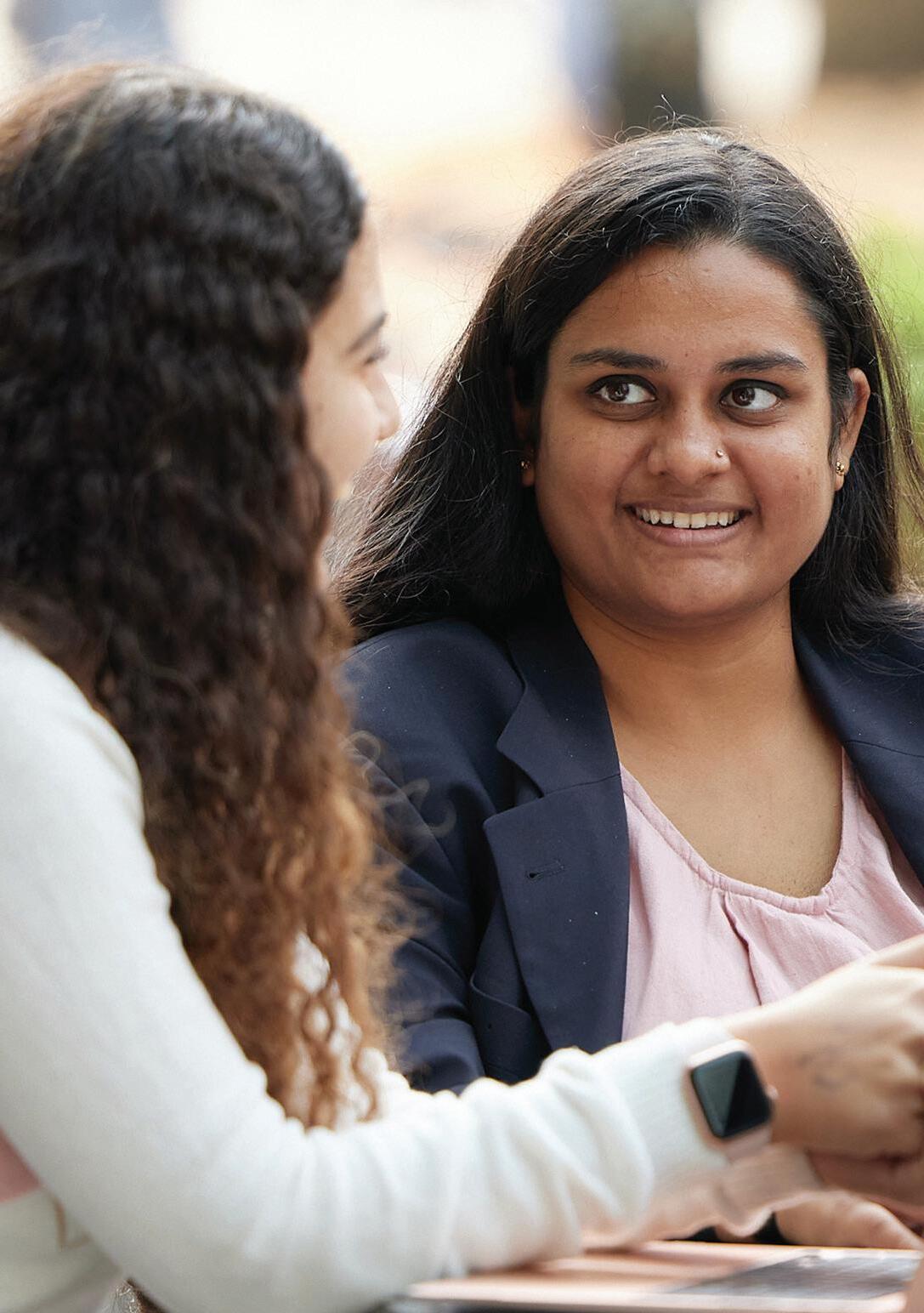
This framework was co-created by the UBC Sauder EDI Committee and the UBC Sauder Dean’s Office. It represents the structure of our EDI Strategic Planning for the UBC Sauder School and has been used to create a series of specific actions, KPIs, accountability partners, and timelines for strategic actions.
Principle
1. An Inclusive and Respectful Community
A UBC Sauder community with EDI knowledge, skills, and practices and the organizational capacity to enhance a culture of inclusion, belonging, and collaboration.
Goal
A. A Community That Embraces EDI
• Sponsor the development of EDI competencies through training and learning.
• Promote commitment and capacity through increased collaboration between and among leadership, unit heads, and various stakeholder groups (faculty, staff, students, and alumni).
• Work with the Senior Associate Dean, Equity, Diversity, Inclusion, and Sustainability to review and enhance policies, practices, and actions that support EDI.
B. Inclusive Teaching and Learning
• Support inclusive course design, teaching practices, and assessments.
• Promote respectful and inclusive learning.
• Welcome and encourage student feedback and perspectives on their learning experiences.
• Integrate a diverse range of perspectives, including Indigenous identities, cultures, values, and ways of knowing, in our approach to teaching and learning.
C. Inclusive Research
• Provide support for EDI-themed research.
• Ensure equitable and inclusive practices in award nominations and in the allocation of research grants.
2. Diverse and Vibrant Faculty, Staff and Students
Recruiting and retention practices that eliminate biases and barriers, and increase representation of underrepresented and marginalized groups in order to create an organization that embodies diverse perspectives, as well as enhances feelings of belonging, safety, and accessibility.
A. Accessibility
•. Ensure accessibility for faculty, staff, students, alumni, and visitors with disabilities.
B. Equitable Recruitment
• Develop recruitment practices and metrics to ensure inclusion of underrepresented and persistently marginalized groups.
• Enhance active recruitment for EDI competencies and capacity to excel and contribute in a diverse work environment.
C. Equitable Retention and Career Advancement
• Implement retention practices that support equity, diversity, and inclusion.
• Recognize service contributions to EDI in performance reviews.
3. Accountability, Engagement and Communication
Timely reporting processes, community engagement, and transparent communication to the broader UBC Sauder community.
A. Accountability
•. Establish channels for all UBC Sauder units to report their EDI initiatives, activities, and metrics as part of annual strategic planning.
• Report annually to the Dean on progress of EDI Principles and Goals, including actions undertaken across the School.
B. External Dialogue and Engagement
• Embed EDI criteria in partnerships with employers, external contractors, Indigenous communities of interest, alumni, and other external stakeholders toward supporting an inclusive environment at UBC Sauder.
C. EDI-related Communication
• Develop a communications strategy to report to our community on EDI initiatives and impacts that include an EDI webpage and the EDI Committee Annual Report.
Our goal in this section is to present some of the highlights of the EDI work happening throughout UBC Sauder. The list is not exhaustive, and does not fully capture the work that so often happens within the learning in our classrooms, in social settings and informal conversations, and through sharing feedback and respectfully challenging each other to live by UBC Sauder’s values.
In this section, we have compiled a summary of many of the EDI-related initiatives, activities, and events that have taken place at UBC Sauder over the past year (April 1st, 2022 to March 31st, 2023). In sharing what has been done, we are working to continue to grow as a school and to advance equity, diversity, and inclusion at UBC Sauder.
We acknowledge this document does not fully encompass all of the work that needs to be done or all of the work that is ongoing, and that our work in EDI must extend beyond initiatives, activities, and events and into our policies, systems, procedures, and institutional foundation for continued systemic change in EDI. We invite and welcome ideas, feedback, suggestions, and input on initiatives, activities, and ideas that will strengthen and improve EDI at UBC Sauder.
We have organized our UBC initiatives and activities by using our principles and goals as an organizing framework. We note that some actions might reflect multiple goals, but we have endeavoured to not be repetitive in our reporting.
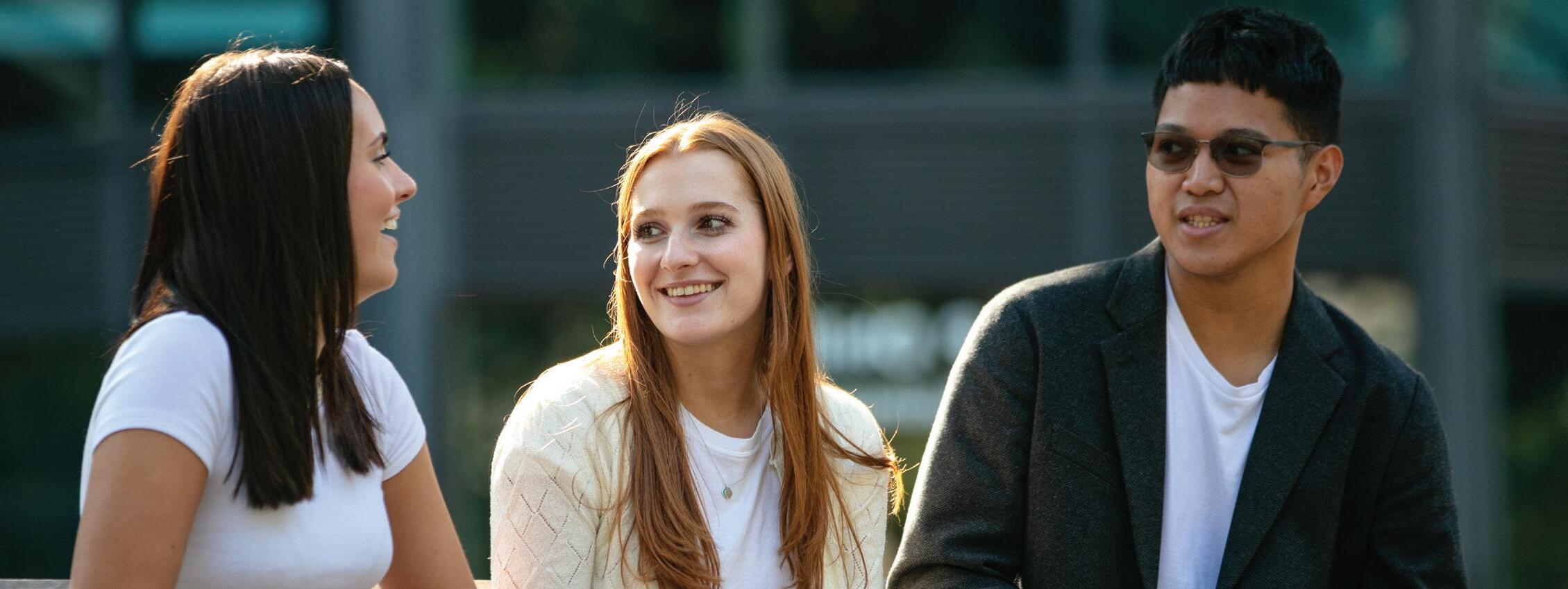
A UBC Sauder community with EDI knowledge, skills, and practices and the organizational capacity to enhance a culture of inclusion, belonging, and collaboration.
The advancement of equity, diversity, and inclusion serves as a key foundational objective in our newly minted UBC Sauder Strategic Plan. Here is the articulation of the EDI Objective and related higher-level actions in the 2023-2028 UBC Sauder Strategic Plan:
Advance equity, inclusion, and a sense of belonging across UBC Sauder’s diverse communities
Promote and support commitment and capacity for ongoing progress on equity, diversity, and inclusion initiatives
Attract and retain students, staff, and faculty who represent diverse perspectives, experiences, and identities
Create support structures that meet the unique needs of our diverse communities and enhance belonging and well-being
Work to dismantle historical inequities and eliminate barriers to access for all in a way that amplifies the perspectives of our marginalized communities
As noted above, the UBC Sauder EDI Committee has articulated a set of principles and goals to guide the EDI work of the School. The EDI Committee and the UBC Sauder Dean’s Office have also worked together with the Dean’s Office to create an EDI strategic planning document that outlines specific strategic actions we are taking, consistent with our articulated goals and principles. This report largely reflects the actions and tracking of this strategic planning.
As part of this strategic planning process for the EDI Committee, in 2022, the UBC Sauder EDI Committee worked with a leading EDI consultancy group, Bakau Consulting, to conduct focus group sessions with students, staff, faculty, and alumni. These sessions focused on recruiting feedback from our UBC Sauder communities about their experiences and recommendations related to enhancing EDI at UBC Sauder. Based on what we heard from our community members, we have prioritized these five areas of work in our goals related to EDI, which reflect the themes throughout this report. These are some of the key initiatives linked to our strategic planning that we have been working on in the past year:
Create more ways to listen and get feedback from our UBC Sauder Communities
• Collected and analyzed data for the inaugural UBC Sauder EDI Student Survey
• EDI Course Mapping Survey with faculty conducted and analyzed
Communicate better to our UBC Sauder communities on values, priorities, and initiatives
• UBC Sauder EDI webpage (ongoing)
• UBC Sauder EDI Annual Report (annually, ongoing)
• Establishment of the EDI Committee Communications Working Group (underway)
Improve the
around complaints or concerns
Better integrate EDI into coursework and programs; more resources and training
• Developed a new resource for the complaint process at UBC Sauder: https://www.sauder.ubc.ca/edi-support
• Teaching and Learning Enhancement Fund (TLEF) Grant: Course mapping and EDI resources (underway)
• Establishment of the EDI Committee Inclusive Pedagogy Working Group (underway)
• Establishment of the EDI Committee Training Working Group (underway)
• Several UBC Sauder-wide events and training sessions related to EDI
Encourage more “grassroots” participation and ways to get involved from our UBC Sauder Communities
• UBC Sauder EDI Action Fund
• UBC Sauder EDI Research Catalyst Grant
• ‘How to get involved’ now better showcased on the UBC Sauder EDI webpage
• Establishment of the Equity and Inclusion Committee of the Commerce Undergraduate Society (CUS)
Delivered by Ch’nook Indigenous Business Education (Ch’nook), the Aboriginal Management Program (AMP), created by UBC Sauder in 2022, is an executive education-style management program for aspiring Indigenous entrepreneurs, community leaders, and economic development staff from across Canada. Programming includes foundational business classes, Indigenous guest speakers, and Musqueam Elder incorporation. AMP was a hybrid delivery program in 2022, with 11 participants graduating from the program in June 2022.
Delivered directly in Indigenous communities by Ch’nook since 2017, this customizable and accelerated program in entrepreneurship, business administration, and project management has been supported in part by UBC Excellence funding. Each Accelerated Business Program (ABP) delivery is tailored to reflect the needs and desires of the partnering community or organization. To date, the program has been offered to participants in Vancouver, Bella Bella, Port Alberni, Anahim Lake, and the Tsilhqot’in National Government communities (Tl’etinqox, Xeni Gwet’in, TsI Deldel, Tl’esqox, Esdilagh, and Yunesit’in). ABP was run synchronously in Summer 2021 for a Tsilhqot’in cohort and also asynchronously for Tsilhqot’in community members who did not have access to internet or for those needing more flexibility with course scheduling. In Summer 2022, student instructors developed an asynchronous entrepreneurship course at the request of the Musqueam Training Office, including new video modules and more digital content.
Similar to the Aboriginal Management Program, the Métis Nation British Columbia (MNBC) Business Management Program offers a series of introductory business classes and Métis guest speakers. Based on the successful delivery of the pilot MNBC Business Management Program in 2021, MNBC asked Ch’nook to offer a second delivery starting in November
2022. To complement the program, Ch’nook created a Métis Elder in Residence Program to support student participants by sharing cultural teachings and traditional knowledge. Fourteen students graduated from the MNBC Business Management Program in March 2023.
In 2022, the Ch’nook Office delivered a pilot senior leadership program in partnership with Métis Nation British Columbia (MNBC). This virtual program centers around MNBC’s strategic plan and provides executive business training in leadership development and principles, operations, finance, and accounting for senior MNBC leadership. The program commenced in September 2022.
In October 2022, Ch’nook offered a three-evening executive education-style course in conflict resolution, geared towards Indigenous business professionals, managers, team leaders, and supervisors responsible for maintaining a healthy and productive workplace. Enrollment was based on a lottery system with sixteen seats offered to Ch’nook alumni. The online course offered key strategies for dealing with workplace conflict including applied skills to effectively participate in collaborative, interest-based conflict engagement and resolution.
In April/May 2022, Professor Daniel Skarlicki delivered a two-day customized Executive Education program on Navigating Complex Negotiations for a First Nation Government-toGovernment table/entity, inclusive of a consortium of Secwépemc communities and their respective Campfire/ Divisions within Secwepemcúlecw (Secwépemc territory/BC Interior). These Secwépemc communities and their respective Campfire/Divisions are preparing for their negotiations with various B.C. ministries with the goal of transforming Secwepemcúlecw within their Areas of Responsibility and achieving reconciliation.
The Ch’nook Scholars Program, started at UBC Sauder in 2007, supports Indigenous post-secondary business students through scholarships and enriched educational and networking experiences that help develop their leadership skills while offering a range of business tools, connections, and other benefits. The 2022-2023 Ch’nook Scholars Program wrapped up in April 2023. The Fall Scholars Gathering happened at UBC in Vancouver with guest speakers including Ch’nook alum and consultant Sheryl Rivers, a consulting case challenge with Deloitte, and a networking session with the Indigenous Intern Leadership Program. The Spring Gathering, hosted at VIU in Nanaimo, included activities such as a tourism business symposium, nature walk with Elder Randy Fred, and a lively discussion about the inclusion of Indigenous topics in the business curriculum. This year there were 25 Scholars enrolled in the program from 13 universities and colleges in British Columbia and Alberta.
The Spitz Fellows Program, launched with the generous support of the Spitz family in 2015, is a unique opportunity for Indigenous women (Canadian students who identify as women and First Nations, Métis, or Inuit) pursuing a Bachelor of Commerce (BCom) at UBC Sauder. The program is open to direct entry, transfer, and current students who demonstrate academic achievement, community engagement, tenacity, leadership skills, and service to others. The program provides students with awards valued at a minimum of $10,000 per academic year, which may be renewed until the Fellow graduates from the UBC BCom program. There were nine Spitz Fellows this past year.
Continuing Business Studies (CBS) has been supporting and providing project management training to the St’át’imc group since October 2020. Participants include St’at’imc community members and St’at’imc Government Services staff. Their Education and Training department seeks to deliver programs to prepare St’at’imc members to access economic opportunities in St’at’imc Territory, in particular with opportunities related to BC Hydro, which has major infrastructure in their territory. They have consistently heard from members, St’at’imc businesses, and BC Hydro that project management training was needed, and has potential to strengthen capacity of St’at’imc businesses and increase access to opportunities with BC Hydro. For more information see: https://statimc.ca/
The UBC Sauder School of Business is working to ensure that Indigenous content is expanded and restructured across the Bachelor of Commerce (BCom) curriculum. UBC Sauder offers Indigenous guest lectures on current topics and the exploration of Indigenous issues and literature. Indigenous content has been included in the following required courses that will be taken by every student: Values, Ethics, and Community (COMM 105), Business Writing (COMM 390), and Environment, Society, and Government (COMM 394). In addition, COMM 386T and BAEN (Indigenous Relations and Economic Development) are both dedicated to Indigenous topics. (Note: to see more on content see page 28).
Many of these courses have integrated some of this Indigenous content into their curriculum over the past year utilizing the BMO Aboriginal Business Teaching Fund. These courses have included features such as Indigenous Cultural Awareness training, Indigenous peer mentoring, Indigenous support with lesson planning, curriculum development and communications, Indigenous subject matter expertise for a repository of Indigenous business course materials, Indigenous guest speakers and subject matter experts for Indigenous relations, economic development, Indigenous history and Indigenous business, as well as Indigenous representation for “Business Pitch” sessions.
Teaching and Learning Enhancement Fund Grant: Indigenizing the Curriculum
The TLEF funded project “Llgaay gwii gina sk’aadGa ‘láas ad Xaaydas gina Ganunsid: Enhancing Business Education with Indigenous Knowledge” continues to make progress in the areas of Indigenization and decolonization. In the 22/23 year, another 20 faculty participated in base-line setting training, and the TLEF team developed advanced training modules which are nearly ready for participation. Indigenous perspectives and assignments supported by this project were expanded across BCom courses, and are now reflected across COMM 101, 105, 196, 220, and 390. For example, Jeff Ward, CEO of Animikii Indigenous Technology, joined the COMM 101 classes for a Q&A on entrepreneurship and innovation. For the 23/24 year, the project team looks forward to expanded work with faculty on training and curriculum development, launching the online resource hub, and continuing to cultivate the essential relationships with Indigenous people and communities that support these activities. This work is in alignment with UBC’s Indigenous Strategic Plan, and specifically addresses goals 4, 6 and 7. (Note: to see more on this content see page 25).
Our inclusive hiring training module was provided to faculty members who were hiring this year. Topics included UBC policies and procedures related to hiring, foundations of EDI, implicit bias, and best practices around strategies for hiring inclusively.

The creation of a UBC Sauder EDI training program is underway. The program for staff and faculty is a self-paced Canvas course that accommodates the different knowledge and needs of each participant. Participants will be able to choose different paths composed of different modules. These tracks include an introductory track for those who are newer to EDI concepts, a more intermediate track for those with some knowledge, and an advanced track for those who already have a background in EDI. Our EDI training program is designed to meet our community members where they are, to give them the personal EDI tools and knowledge they need in order to work towards a common goal of creating a better future for all members of our community. The program is expected to launch in Fall 2023.
This workshop provided an overview of Universal Design for Learning (UDL). UDL is an approach that allows instructors to remove barriers in learning environments by intentionally adapting their teaching to be suitable for a diverse range of students with varying needs. In this workshop, instructors from the Centre for Teaching, Learning, and Technology, Afsaneh Sharif (Instructional Designer, Centre for Teaching, Learning, and Technology), Nausheen Shafiq (Curriculum Consultant, Centre for Teaching, Learning, and Technology), and Sunah Cho (Faculty Liason, Centre for Teaching, Learning, and Technology), defined UDL, its principles, how it works, and how it can be applied to teaching practices. Attendees had the opportunity to identify challenges, reflect on their students’ experiences, and discuss UDL strategies for reducing barriers to highly-engaging learning opportunities.
Three sessions on Indigenous Cultural Awareness with Qwastånayå (Maynard) Harry have been delivered in the past year. The goal of these sessions is to increase awareness and understanding of Indigenous People and their history in the Canadian context. The sessions aim to increase knowledge on topics such as Canada’s Indian Act, the Indian Reserve System, the Indian Residential School System, as well as reconciliation and Aboriginal rights and title. To date, 249 staff and faculty have attended these sessions.
Many faculty and staff completed our Decolonial 101 workshop, which focused on helping participants to locate themselves on the land, connect with the colonial history found there, and understand their personal relationships with that history as it shows up in their work and lives. The workshop also explored privilege, positionality, and institutional norms. In addition, we have offered some base-line setting training that has been transitioned from an in-person model to a hybrid model of asynchronous learning through the San’yas Antiracism Indigenous Cultural Safety Program (sanyas.ca/ core-training/british-columbia) combined with local discussion groups to achieve greater accessibility. In total, 75 people have taking the Decolonial 101 Training (58 people) or the San’yas Core training (17 people)
Through the Diversity and Inclusion Leadership Council (DLC) in partnership with the Canadian Centre for Diversity and Inclusion (CCDI), all staff in HR have completed level one of this training and most have completed their full certification. The remainder of the team is working towards completion of the full certification in 2023. The purpose of this training is to provide basic knowledge around the fundamentals of EDI, implicit bias, and respect in the workplace.
One hundred percent of the management staff in Resources & Operations have completed ‘Supporting Mental Health in the Workplace for Managers and Supervisors’ training to support and enhance workplace mental health.
Two sessions of UBC Sauder Engaged onboarding for new staff were offered this past year. The goal of the sessions is to familiarize new staff with the School and its values. Speaker Dr. Kate White covered topics of EDI and implicit bias in organizations, and representatives from Ch’nook Indigenous Business Education reviewed the Indigenous Strategic Plan, reconciliation at UBC, Indigenous cultural awareness, definitions, resources, land acknowledgements, and engaging with Indigenous partners such as the Musqueam Protocols Office.
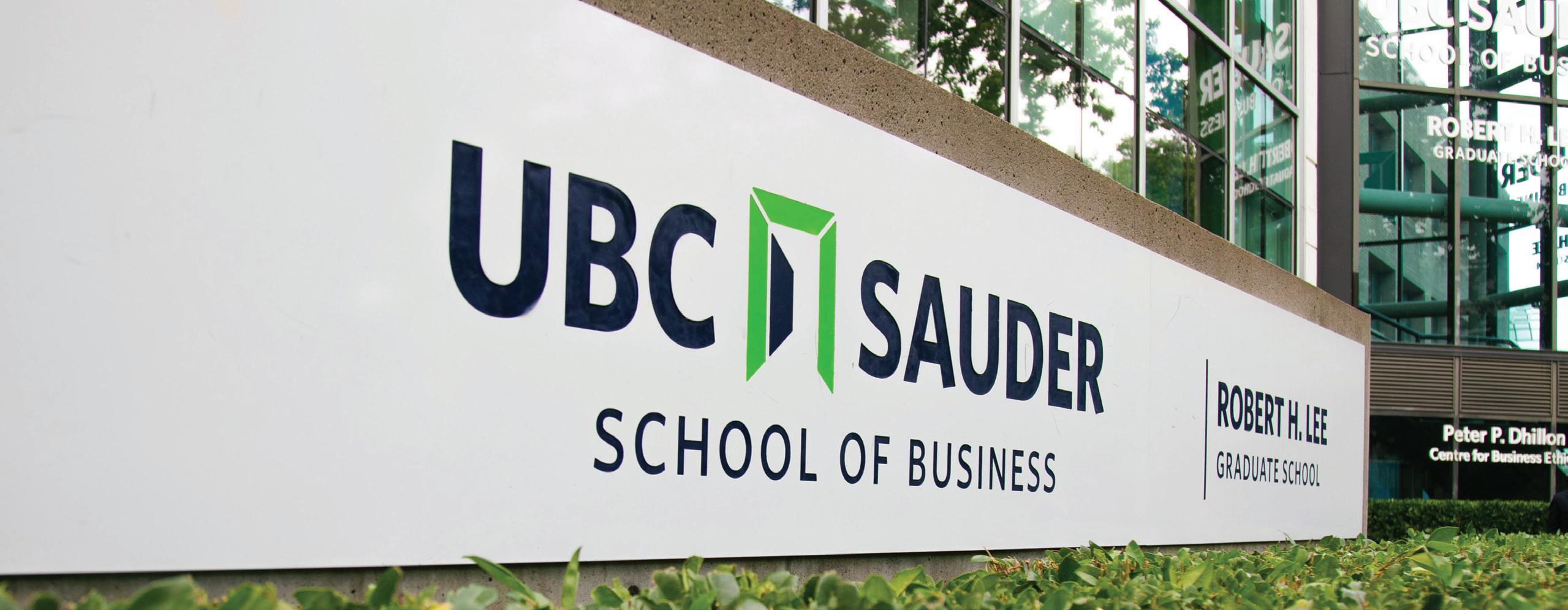
As part of our reflections on Black History Month and Pink Shirt Day, this workshop by Kenza Derkoui from Bakau Consulting invited participants to experience a “journey with anti-oppression.” The session covered several themes, including: what is oppression, what are some critical perspectives, and what are the impacts? Participants concluded by exploring some ways to move forward and what this might look like for an organization.
The Indigenous Authors Book Club is a journey to one’s personal sense of reconciliation by walking in the footsteps and seeing history through the eyes of Indigenous authors who have survived and are sharing their stories of triumph over adversity. Each season, a book by a Canadian Indigenous author is selected to be read over a six week period. At the end of each season, the book club meets to discuss all that they have learned from the author’s version of their history and consider what they would like to do to commit to reconciliACTION.
“Essential reading is for everyone who cares about Canada and who seeks to understand Native people, their issues and their dreams” – Richard Wagamese, Ojibwe Canadian author and journalist from the Wabaseemoong Independent Nations in Northwestern Ontario.
The Peter P. Dhillon Centre for Business Ethics and the UBC Sauder Dean’s Office have created the new JEDDI (Justice, Equity, Diversity, Decolonization, & Inclusion) Seminar Series (www.sauder.ubc.ca/thought-leadership/research-outreachcentres/peter-p-dhillon-centre-business-ethics/events/jeddi) featuring academic and business thought leaders sharing their experiences and strategies for creating more just, equitable, diverse, decolonized, and inclusive workplaces. Four JEDDI talks were delivered over the past year:
• Indigenizing Business Curricula with Jordyn Hrenyk (Simon Fraser University) and Emily Salmon (University of Victoria)
• Gender Inequality at Work with Aruna Ranganathan (University of California, Berkeley), co-hosted by the OBHR Division
• Building More Equitable Societies with Neil Lewis, Jr. (Cornell University), co-hosted by UBC-DIBS

• Leadership, Gender, & Race with Ashleigh Shelby Rosette (Duke University)
In June 2022, the theme of our Senior Leaders’ Retreat was “Culture and EDI.” This included workshops on Belonging in the Workplace, led by Indy Batth from IKB Consulting and Coaching, and on Hiring and Retaining People with Disabilities, led by Jamie Millar Dixon from MacLeod Silver HR Business Partners.
A number of additional events have been formally hosted by UBC Sauder over the past year, which have helped to explore and spur discussions around several topics related to EDI. The goals of these events are to further enhance our culture of EDI and to increase understanding, comfort, and competencies on key EDI topics. These events include:
• Indigenous Peoples Day Tour at the Museum of Anthropology.
• Truth and Reconciliation on Orange Shirt Day: Deborah Johnson, from Alkali Lake First Nation, spoke to our employees and faculty to share her story on Truth and Reconciliation Day.
• Pink Shirt Day: held learning opportunities training with Bakau Consulting. Fundamentals of Anti-oppression, to align with Pink Shirt Day.
• Lunar New Year:
– Treat and red pocket hand-out
New Year Tea Ceremony and Calligraphy Demo, with Helen Liu, Wei Cheng, and Ruibin Liang
– Annual Lunar New Year event in Shanghai for the alumni community lead by Parker Xu, Alumni Engagement Officer
RHL Staff and student co-hosted event that showcased captivating cultural dances, a Dynasty show-and-tell, distribution of red pocket envelopes and a spread of traditional cuisine.

• Celebration of Eid al-Fitr: We celebrated Eid al-Fitr with UBC Sauder faculty and staff by having a presentation about the meaning behind Eid and Ramadan. The group had some very thoughtful questions and discussion where we all learned more from each other’s experiences. We also enjoyed having some delicious sweet and savoury Middle Eastern snacks.
• International Women’s Day: A school-wide event was held for students, employees and faculty. Speakers Dr. Martha Piper and Dr. Indira Samarasekera were complemented with a clothing drive in support of Dress for Success and Downtown Eastside Women’s Centre.
On January 23, 2023 the UBC Sauder People and Organizational Development team celebrated the Lunar New Year with employees by offering a variety of surprises and activities to welcome the Year of the Rabbit. This included offering Chinese bakery items like Pineapple Buns and Egg Tarts to employees while Dean Darren Dahl surprised everyone by offering Red Envelopes, which symbolize good wishes and luck for the new year ahead.
We also held an event led by local artists Helen Liu, Wei Cheng, and Ruibin Liang that all employees and faculty were invited to attend. To begin, Helen Liu guided the group through a meditation to say goodbye to the
energy from the Year of the Tiger and welcome in the energy from the year of the Rabbit. Following this powerful meditation, the group had time to either practice calligraphy by drawing Year of the Rabbit characters or participating in a traditional Gongfu Tea Ceremony. We were pleased to create a meaningful celebration for this important time of year.
We look forward to celebrating more days of significance throughout the rest of the year and will continue to highlight different days of significance that reflect our various UBC Sauder communities moving forward.

This is the second year for the UBC Sauder EDI Action Fund (www.sauder.ubc.ca/current-students/ubc-sauder-edi-actionfund), which was created by the UBC Sauder EDI Committee and the UBC Sauder Dean’s Office. The goal of the fund is to encourage and support EDI events, initiatives, activities, and resources that are from the “grassroots” up. That is, we are hoping to help the ideas dreamed up by members of our UBC Sauder Communities—students, staff, and faculty—come to life. Among the events funded were the INCLUDED conference created by undergraduates, a UBC Sauder Women Scholars career development event created by graduate students, and a UBC Sauder Women in Business Club networking event created by MBA students.
Grassroots Activities and Events from our UBC Sauder Communities
In addition to formal training sessions and activities, many events, groups, and clubs have been created by our faculty, staff, and students. Here is a snapshot of some of the things that have been happening at UBC Sauder initiated by our community members:
The CUS is one of the largest undergraduate business school organizations in Canada. Guided by the pillars of personal, professional, and academic success, the CUS supports members through initiatives, services, and clubs that host networking events, workshops, conferences, case competitions, and much more. The CUS strives to build an inclusive community where students feel empowered to discover their own journeys and unique experiences within the CUS and throughout their university years at UBC Sauder. Here are some of the things the CUS has been working on related to EDI in the past year:
This year the CUS began running more educational workshops on topics such as gender identity for CUS service providers. The CUS created internal workshop materials that will allow future CUS student leaders to receive more EDI training before they take on their roles and throughout the school year. The CUS has also complemented these educational resources with running short social media campaigns.
The CUS EDI team produced four broadcasts this year covering the topics of Truth and Reconciliation, Municipal Elections, Black History Month, and the AMS Trans Healthcare Referendum. These broadcasts help create more student awareness of important issues throughout the year and the roles that business leaders can play in learning and addressing the impacts they have on our community.
Increased collaboration with EDI leads from other faculties and UBC EIO office
More interfaculty connections have been made both at a student and an administrative level. These relationships were built with participation within the AMS Equity Circle and SEEN (Student Equity Enhancement Network), setting the foundation for future interfaculty collaboration on EDI initiatives, as started by this year’s INCLUDED conference.
Hosted by CUS Equity & Inclusion, INCLUDED was UBC’s first interfaculty conference connecting members of our community to professionals furthering EDI. The event featured a workshop about how students can drive inclusive change in their careers, followed by a panel of professionals sharing stories of how they have created space for EDI across different industries. This event was sponsored by the UBC Sauder EDI Action Fund and UBC Alma Mater Society (AMS).
The beginning stages have been set for a CUS 5-year strategic plan that would emphasize increasing the capacity and the programming for EDI work over a longer time scale.
CARBLOAD is a pizza lunch hosted by and for 2SLGBTQIA+ faculty, staff, and students. Some weeks the group engages in team building activities, other weeks they bring in alumni guest speakers to share their experiences, from coming out to navigating their career. There is no membership, simply an open invitation to come as you are, connect with others, and enjoy some complex carbohydrates. CARBLOAD typically sees 40-50 students, staff and faculty at each lunch hour. The 2022 Academic Year had record attendance, with one graduating student exclaiming “This is by far the most amount of queer people I’ve seen in one room at Henry Angus, and it warms my heart.” Progress towards making this school a welcoming place for all is happening, one slice of pizza at a time.
The Indigenous Business Association (IBA) is a student-run AMS-affiliated club aiming to provide students (predominantly those enrolled in the UBC Sauder School of Business, though other faculties welcome) with the chance to have new opportunities, grow their network, engage in events, and find a home away from home. As we all know, the Indigenous community faces many hardships, both past and present, in the economic world and otherwise. With IBA, we hope to help in the initiative to reduce barriers and set students up for success through their educational and professional journey here at UBC. IBA also provides students with an environment where students can engage in activities - some with cultural significance - in hopes to help decolonize and revitalize the environment within the UBC Sauder and UBC community. Some activities sanctioned by IBA include, but are not limited to, collaborations with Indigenous businesses to provide recruitment and networking workshops, tours of UBC Sauder for incoming Indigenous students, mentorship opportunities, bringing in Indigenous entrepreneurs and alumni to talk about their experiences, online resources for students, club socials, conferences, cultural workshops, and more.

The UBC Sauder Women in Business Club (WIB) aims to provide a supportive community and professional network to women coming from different walks of life. Officially founded in February 2010, WIB’s mission is to encourage more women to take leadership roles, especially in previously unconventional industries (for women) such as technology and finance, to accelerate gender parity. With its ability to look beyond biases, drive to share opportunities with the deserving, and a resource full of business knowledge, the club provides development opportunities, links to the greater business and social community, and events that bring awareness to MBA students on different topics such as business opportunities and roles, gender stereotypes, upcoming growth challenges, and so on. The club invites business leaders and entrepreneurs from a variety of functional areas to help women navigate their careers through panel discussions and workshops. The club also provides a platform for women to come together and share their personal challenges and victories by regularly organizing ‘lean in’ circles. Moreover, the club works to bring together not only women but also other genders to act as allies for more diverse and inclusive classes and workplaces.
The UBC Sauder Women Scholars (SWS) Program was established in 2017 to offer support and a sense of community to UBC Sauder graduate students who identify as women (PhD/MSc Students). This is achieved by arranging casual meetups and mentoring sessions with accomplished leaders, including UBC Sauder professors across disciplines and other influential figures from academia and the corporate world. During these mentoring sessions, leaders share their experiences, which not only enrich the personal and professional lives of the participants, but also provide them with access to resources that facilitate the transition from graduate school and position them for success.
Moreover, the program serves as a platform for women scholars to connect with one another and foster meaningful relationships. At these informal gatherings, participants have the opportunity to engage in open discussions and build a supportive network with other women scholars who share similar academic and personal experiences. The aim is to create a safe and inclusive space where individuals can find solidarity and encouragement from one another, strengthening their sense of belonging within the UBC Sauder community.
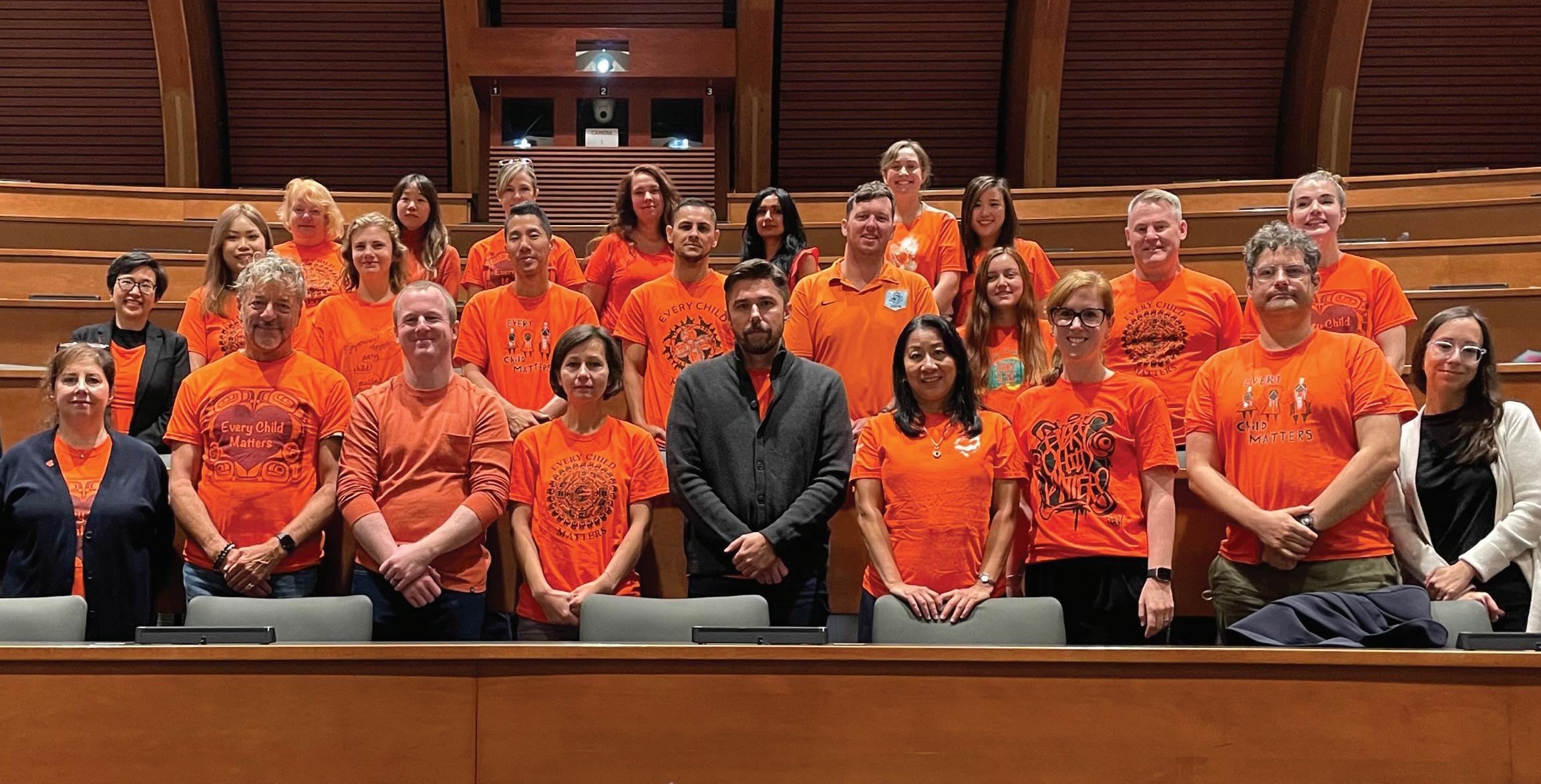

The UBC Young Black Professionals (UBC YBP) is committed to professionally empowering all Black students in the UBC community. With a mission to improve career prospects, create awareness, and encourage action, the inclusive efforts of UBC YBP develop and foster a community of resilience. This community welcomes students, educators, and innovators committed to achieving professional excellence as it connects Young Black Professionals with resources and relationships with corporate partners. The collaborative club provides scope in professional development, networking, and talent pipelines. UBC YBP strives to be outstanding in Black talent cultivation, community, excellence, and opportunity. Ultimately, UBC YBP’s commitment to progressive advancements in the Black Community acts as guidelines for member development. UBC Sauder has been providing resources that support this initiative and many of the group’s members are UBC Sauder students.
Young Women in Business UBC (YWiB) is a student-run organization that strives to create a community for all students - no matter their background, faculty, or gender identity - to feel supported and accepted on their journey to personal, professional, and academic development. The club offers students the chance to meet professionals, explore new industries, and make life-long friends. We are passionate about breaking down barriers for marginalized communities entering the business field by hosting educational events, networking evenings, a mentorship program, case and stock pitch competitions, and more. YWiB hopes to showcase as many fields and possible career paths as possible, and appreciates the support of UBC Sauder to provide resources and meaningful connections with alumni and industry professionals.
In the Spring of 2021, the UGO team developed an EDI action plan to identify specific actions and steps to weave EDI into their orientation programming. The goals of these actions were to reinforce UBC Sauder’s positive culture of collaboration, respect, and inclusion, to be inclusive and welcoming in our orientations and other programs, and to increase comfort, knowledge, and competencies in EDI.
Examples of some specific actions are:
• We continue to meet regularly with student leaders from the Commerce Undergraduate Society (CUS) (including the CUS Equity & Inclusion Advisors), to share information, provide coaching support, and nurture a meaningful connection between the CUS and the School.
• We continue to make our events as inclusive as possible. This includes inclusion of pronouns, meaningful land acknowledgements, dietary restrictions, accessibility needs, video subtitles, diverse speakers, universal washrooms, diverse and varied activities, and Community Building Education training for student leaders.
• All of our programs that have a student registration fee (The Spark orientations, Activate Student Leadership Conference) include an option for students to request a full subsidy if they find the cost to be prohibitive to their participation.
• A 2-hour gap was identified in our Spark orientation program, where students who live in residence often go back to their rooms to relax and get ready for the evening event. This year, we expanded our offerings for commuter students during this time, and offered a social dance class, and a Collegia space to be used for relaxing and refreshing. The Collegia space included snacks, couches, charging stations, all-gender bathrooms and showers.
• Our staff team continues to attend various EDI workshops offered by UBC Sauder and UBC.
In order to reinforce our culture of EDI and to develop initial comfort and understanding of core EDI concepts, all RHL students completed an online module (created specifically by the RHL Graduate School for RHL students) on EDI as part of their pre-program onboarding. This module teaches students EDI concepts and terminology, and includes reflection questions to help them better understand the material and connect it to their own experiences.
To further enhance EDI competencies and to continue to weave EDI throughout the student experience, several additional sessions were conducted, including:
• Students from the MM Dual Degree, MM, MBAN, PMBA, and FTMBA Programs all received additional EDI training as part of each program’s opening. This past year we worked with Desmond Nunez on Institutional response to racism and Yvette Wu of Subtext Consulting on common understanding of EDI concepts and why it’s important for their time in the program. We also hosted an Indigenous rights blanket exercise workshop during opening week led by Indigenous elders.
• The RHL Graduate School has introduced the role of VP, EDI in the MM program’s Student Society.
• FT MBA Class of 2023 students created the new Diversity and Inclusion Council as one of their MBA clubs.
• Dr. Toni Schmader led an interactive EDI workshop for students in PMBA Residency 1. Professor Schmader shared some of her current research (testing the efficacy of inclusive culture training to foster greater everyday allyship for women in science, engineering, and technology industries), and asked students to reflect on their own work/ educational experiences. Guided discussion in breakout rooms (about implicit bias, cultural defaults, and other topics) helped to create space for students to share if they wished to.
• A workshop was given to the MM Dual Degree class of 2022. This workshop focused on power and privilege and was led by EDI Facilitator, Indigenous Relations Specialist, and UBC Sauder Alum, Soundous Ettayebi.
• Participants in the IMBA Program received themed teaching on Leading Diversity and Inclusion.
The Hari B. Varshney Business Career Centre (BCC) has supported a number of key initiatives related to EDI themes. The BCC has continued to progress on many initiatives from 2021/22. Some additional examples of the BCC’s EDI efforts include:
• Refreshed the BCC’s suite of career development toolkits, including information about disclosing information regarding disability and identity during the recruitment process, added messaging around the use of gender pronouns, and improved accessibility with new colour palettes.
• Continued to highlight career resources for historically marginalized students, which were co-created by the BCC and UBC Career Services, including featuring the resource in COMM 202 Career Fundamentals. https://students.ubc.ca/ career/career-resources/career-resources-historicallymarginalized-students
• Continued EDI training and education for BCC staff. For example, the BCC hosted Career Management Development Meetings for internal BCC staff, including sessions on supporting students with disabilities and supporting international students. The BCC also partnered with the UBC Sexual Violence and Prevention Office (SVPRO) to deliver an internal BCC staff workshop on UBC policies and practices to support students who disclose experiences of sexual violence and sexual assault.
• Developed a directory of EDI resources for BCC coaching/ advising staff that lists the wide range of initiatives and groups on campus that support equity-deserving students.
• Refreshed the UBC Sauder Talent Report, an employer recruitment guide to hiring UBC Sauder students, and highlighted EDI-related content to industry partners: added UBC Sauder EDI values and vision in the Talent Report, highlighted EDI-focused thought leadership to industry partners, and promoted a directory of EDI-focused clubs and student initiatives that employers can engage with on campus.
• The BCC Business Development Team worked in partnership with several industry employers to host 14 workshops/networking sessions for UBC Sauder students who are part of historically marginalized communities. Select highlights include:
– Accenture: BOLD Student Mentorship Program for Black Students
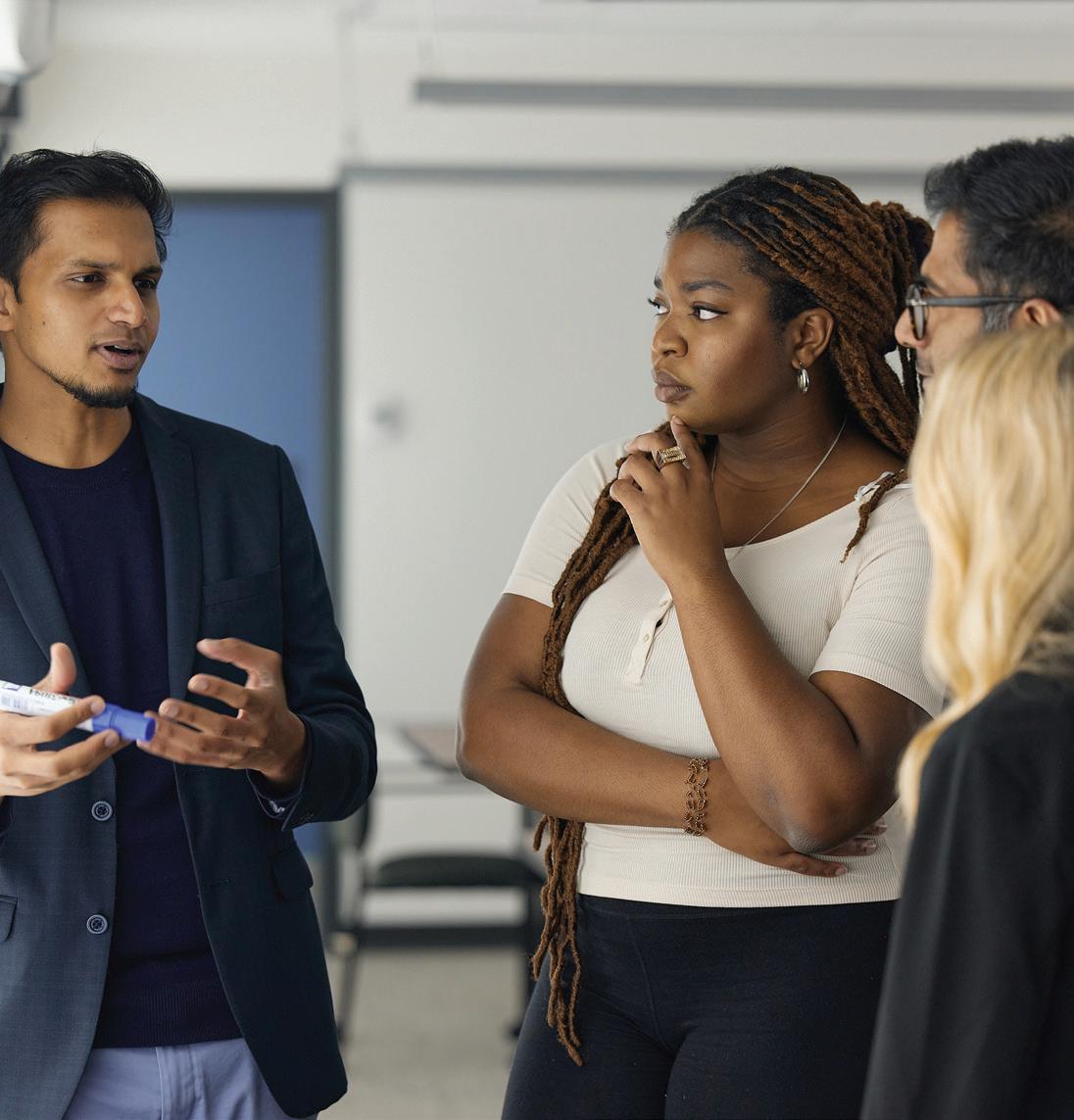
– First Nations Health Authority: Indigenous Student Program
– Toronto Dominion (TD) Bank: Bridging the Gap Scholarship for women, Indigenous students, 2SLGBTQIA+ students, students with disabilities, and/or those who are members of a visible minority group
PwC Scholarship and Mentorship Program for Black, Indigenous, and students with disabilities
– KPMG Indigenous - Fall Recruitment: Information Session
– BMO - Career in Finance: Info session for Indigenous students
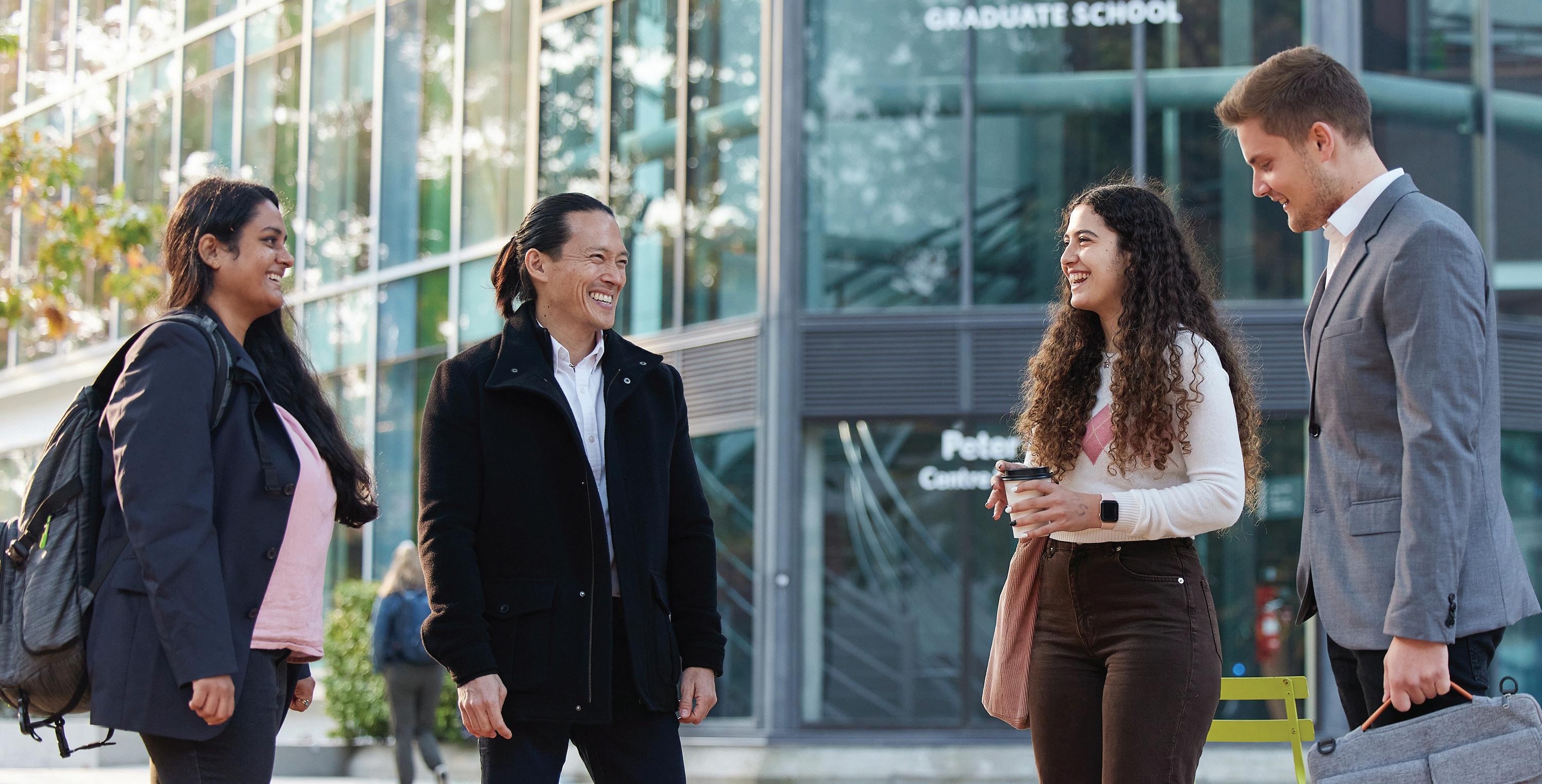
UBC Sauder Librarians support EDI initiatives through service on committees, working groups, and teams, including the Equity Committee of the UBC Faculty Association and UBC Library’s Indigenous Strategic Plan – Library Implementation Steering Team (ISP-LIST). ISP-LIST facilitated live readings for librarians and staff of the Truth and Reconciliation Commission of Canada’s 94 Calls to Action, and the UN Declaration of the Rights of Indigenous People’s 46 Articles. David Lam Librarians and staff enhanced EDI content in the collection, collecting materials in the areas of 2SLGBTQIA+ and gender diversity. To engage patrons further with EDI resources, librarians and staff created displays to celebrate Black History Month, International Women’s Day, and Autism Acceptance Week. Using communication channels, such as the CLC Online, social media, and liaison outreach, they highlighted UBC Library’s EDI acquisitions for UBC Sauder users, including the Ethnic Diversity Source, the NAACP papers, as well as its new EDI Scholars in Residence program.
David Lam Librarians supported Indigenous-based assignments, and the Aboriginal Management Program, through online guides (guides.library.ubc.ca/ MarketResearchOpen), reference consultations and instruction. In March 2023 they began the process of migrating the existing David Lam Library home page to a new version of WordPress, which offers a more accessible user experience. The unit worked on integrating more inclusive practices in its recruitment activities, including expanding applicant pools, and integrating EDI questions into interviews. The CLC team integrated Community Business Education (CBE) Training, which includes an indigenous module to David Lam/CLC student staff onboarding and training experience.
Team members take opportunities to participate in professional development and learning throughout the year. Many took opportunities to participate in EDI and Indigenous-focused professional development opportunities, including UBC’s Hiring Equity course and attending the EDI workshops at The International Centre for Supplemental Instruction (info.umkc. edu/si/) Conference. Librarian Irena Trebic submitted a successful study leave request to build her knowledge of and experience with Indigenous ways of knowing: she will be on leave from July 1, 2023 to December 31, 2023.
Starting in Fall 2022, UBC Sauder faculty and students were awarded and have been carrying out a UBC Teaching and Learning Enhancement Fund (TLEF) Grant entitled: “Embedding Equity, Diversity, and Inclusion into Business Teaching and Learning.” The project is underway and is focused on: a) conducting a course mapping to identify where EDI pedagogy and content currently sits within UBC Sauder courses, b) developing resources and training for faculty on engaging with diversity, building capacity, and enhancing inclusion, and c) monitoring and tracking impacts of these actions over time. The UBC Sauder EDI Committee has created the Inclusive Pedagogy Working Group and EDI Training Working Group to carry out the actions identified in this project.
One UBC TLEF-funded initiative, “Llgaay gwii gina sk’aadGa ‘láas ad Xaaydas gina Gan unsid: Enhancing Business Education with Indigenous Knowledge,” supports UBC Sauder’s development of Indigenous business curriculum through an Indigenous lens. The goals of the project are to weave Indigenous perspectives, knowledge, and competencies into the pedagogy of UBC Sauder. Curriculum resources and training opportunities are being developed to support faculty to approach Indigenous topics in an informed and sensitive manner. (see page 12 for more details).

Another UBC TLEF-funded initiative, the Business Plan Repository, aims to update the business plan repository used for COMM 101 and COMM 120. Part of the goal of this update will be to include more diverse and inclusive stories of owners and operators in the business plan. This will expose our students to businesses with different perspectives, such as EDI, Indigenous, IBPOC, 2SLGBTQIA+, gender, sustainability or climate issues.
Isaac Holloway was named a Universal Design for Learning (UDL) Fellow for updates to COMM 295: Managerial Economics. The UDL Fellows program involves a series of workshops on UDL and the implementation of design principles into a course. For the UDL Fellows program, UDL consists of three principles that aim to foster multiple means of (i) representation of material, (ii) action and expression of knowledge, and (iii) engagement with material. This project will develop case-based in-class activities and assignments by shifting the emphasis away from exams and quizzes toward experiential cases with meaningful engagement with their peers, TAs and instructors. These changes will allow students to demonstrate their knowledge and skills in a variety of ways.
The EDI Committee conducted a course mapping survey to assess the extent of EDI pedagogy and content integration within the programs and courses offered by the School. We have self-reported responses from 99 faculty members, representing 206 unique undergraduate and graduate courses at UBC Sauder.
The results of the survey show that the most commonly employed inclusive teaching practices are 1) being mindful of students’ backgrounds and circumstances when selecting course materials, 2) building rapport and a sense of inclusion through different ways of participation, and 3) encouraging students to contribute their own views and to discover
different perspectives within the course. The least common techniques were 1) inviting guest speakers from a diverse range of backgrounds, 2) selecting course materials produced by and reflecting a range of identities, and 3) factoring in diversity of students when creating groups.
Overall, the survey highlights that faculty are using inclusive teaching practices in much of what they do, but there is still room to grow and consider incorporating additional techniques into teaching. In response to these results, the School is working on a plan to offer additional faculty learning opportunities related to inclusive pedagogy.

This course is designed to provide a broad introduction to the field of business and to orient students to the study and expectations of the UBC Sauder School of Business. In this course, attention is given to showcasing a broad range of people from diverse backgrounds, including CEOs and decision-makers who are women and IBPOC. One class featured an informative discussion with an Indigenous entrepreneur. Another class was focused on concepts of equity, diversity, and inclusion and HR policies or practices for implementing EDI in the workplace.
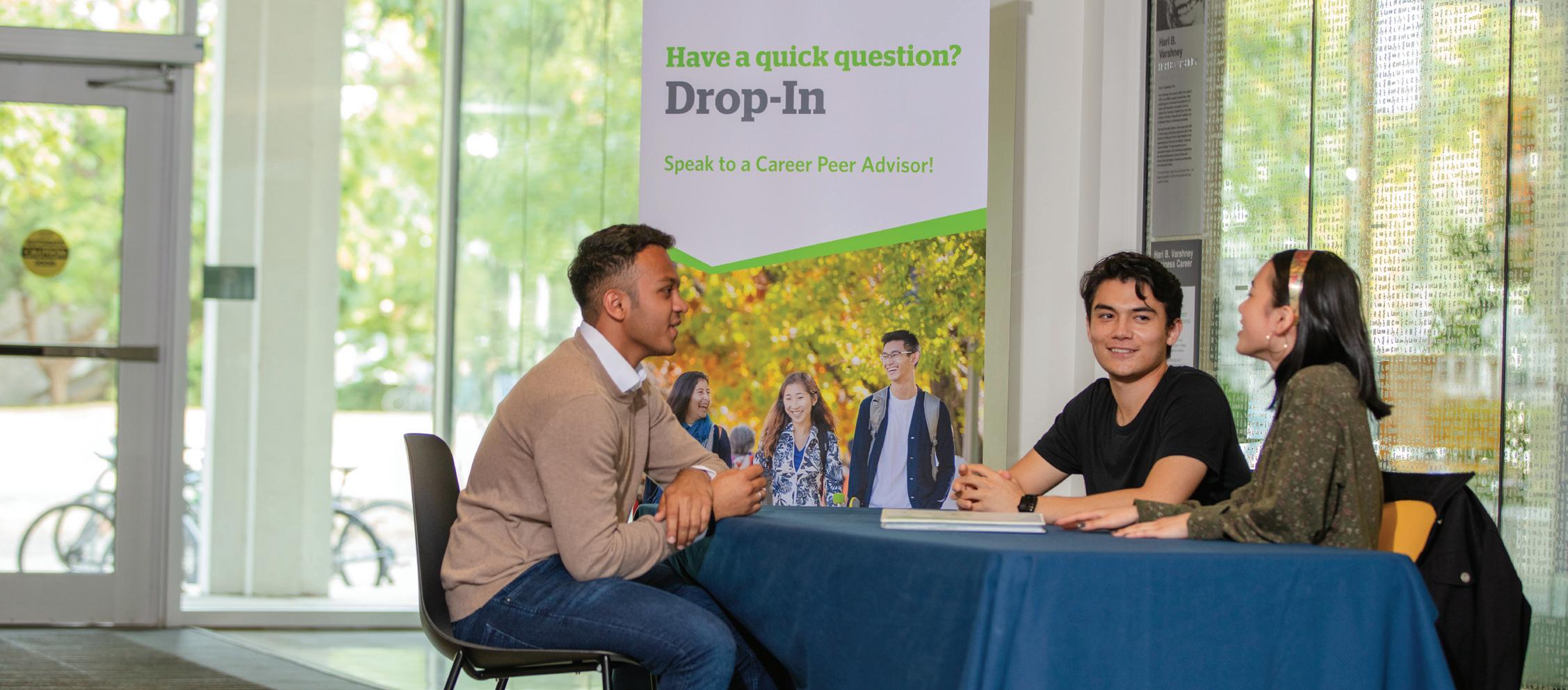
This undergraduate course, which is required for all incoming first year BCom students, was delivered for the third time in 2022. Content and pedagogical approaches related to EDI were woven throughout the course. Specific modules involved discussions of social identity and privilege, psychological safety, and EDI as a core consideration in managerial decision making. The class featured multiple guest speakers. A particular focus was given to Indigenous viewpoints and lived experiences, with three Indigenous speakers featured in the class and a Musqueam Elder Welcome to students in the course on Canvas.
Students in COMM 203 work on case studies that integrate EDI into human resource management challenges. The first case focuses on how to address staffing challenges during the COVID-19 pandemic for an entirely woman-operated business in South Africa. The second case explores options for making workplace accommodations for a job candidate who uses a wheelchair. Class Professor Dr. Sima Sajjadiani updated the presentation project in Comm 203. Student teams are assigned one of 30 recent Harvard Business Review publications that focus on how HR practices address organizational EDI issues. Topics include examining and reducing bias in the hiring and performance management process, mentoring women, improving diversity training, and supporting historically marginalized employee groups. In their teams, students create presentations that connect the articles to concepts from class. They then watch and review other teams’ presentations to get a well-rounded understanding of how EDI is influencing various parts of the HR process.
This is a required course for all BCom students. The course includes learning about Indigenous land rights, the history of Canada with respect to Indigenous Peoples, as well as how to build business relationships built on trust and shared benefit. One major assignment asks students to consider either working for a First Nation in a business capacity, or to write a proposal for a business partnership with a First Nation. In another assignment students are asked to consider the role of private corporations in addressing current ethical and social issues. They are asked to address a serious current social issue in the news, such as Black Lives Matter, mental health checks by police, Indigenous land rights, the war in Ukraine, the opioid crisis, etc. They are tasked with developing a meaningful and ethical response and can include multiple perspectives, including a corporate perspective.
This required course addresses some of the main economic and social challenges facing Canadians today. After analyzing government policies that might promote the public interest, we explore the role for business leaders and the conflicting claims of different stakeholders. EDI issues feature prominently in three parts of the course. First, students do presentations on current issues, (e.g. the problem of unsafe drinking water in certain Indigenous communities). Second, students learn key frameworks for thinking about equity issues. Third, Indigenous guest speakers lecture on the historical and legal context of aboriginal business in Canada. Students then participate in a role-playing activity to illustrate these issues and to learn how to interact in a constructive and respectful way with Indigenous peoples.
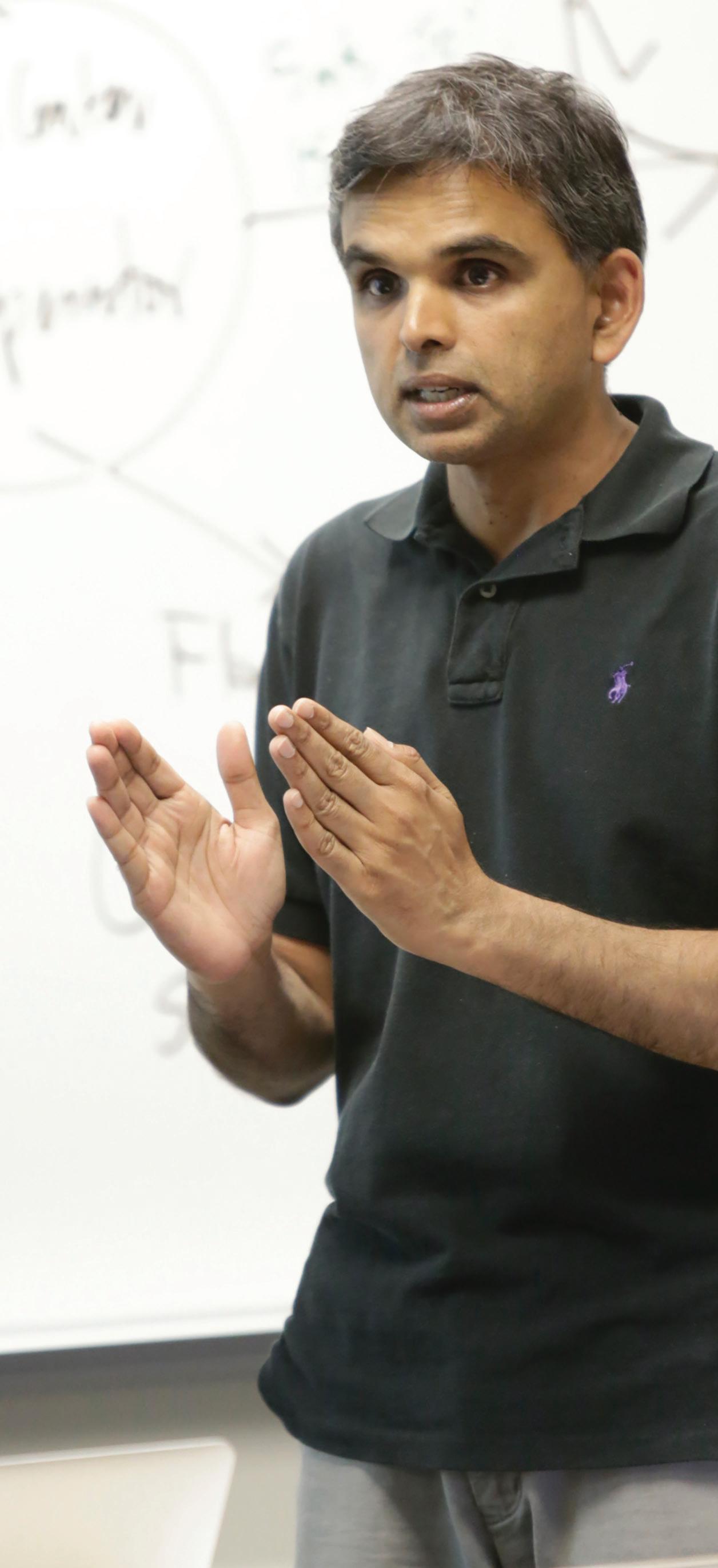
Now running for five years, these two courses offer students an in-depth understanding of the intersection of the private sector and Indigenous communities in Canada. Featuring a wide range of Indigenous guest lecturers, students learn about the governance structures, cultural values, and corporate bestpractices that enable economic reconciliation. COMM 386T included guest lectures from Mark Podlasly (Nlaka’pamux Nation) and Carol Ann Hilton (Hesquiaht Nation).
This undergraduate course was designed to provide students with a foundational understanding about equity, diversity, and inclusion for individuals, teams, and organizations. The course promotes an awareness of the challenges of diversifying work places while encouraging critical thinking and developing problem-solving skills to address the need for greater equity, diversity, and inclusion in organizations.
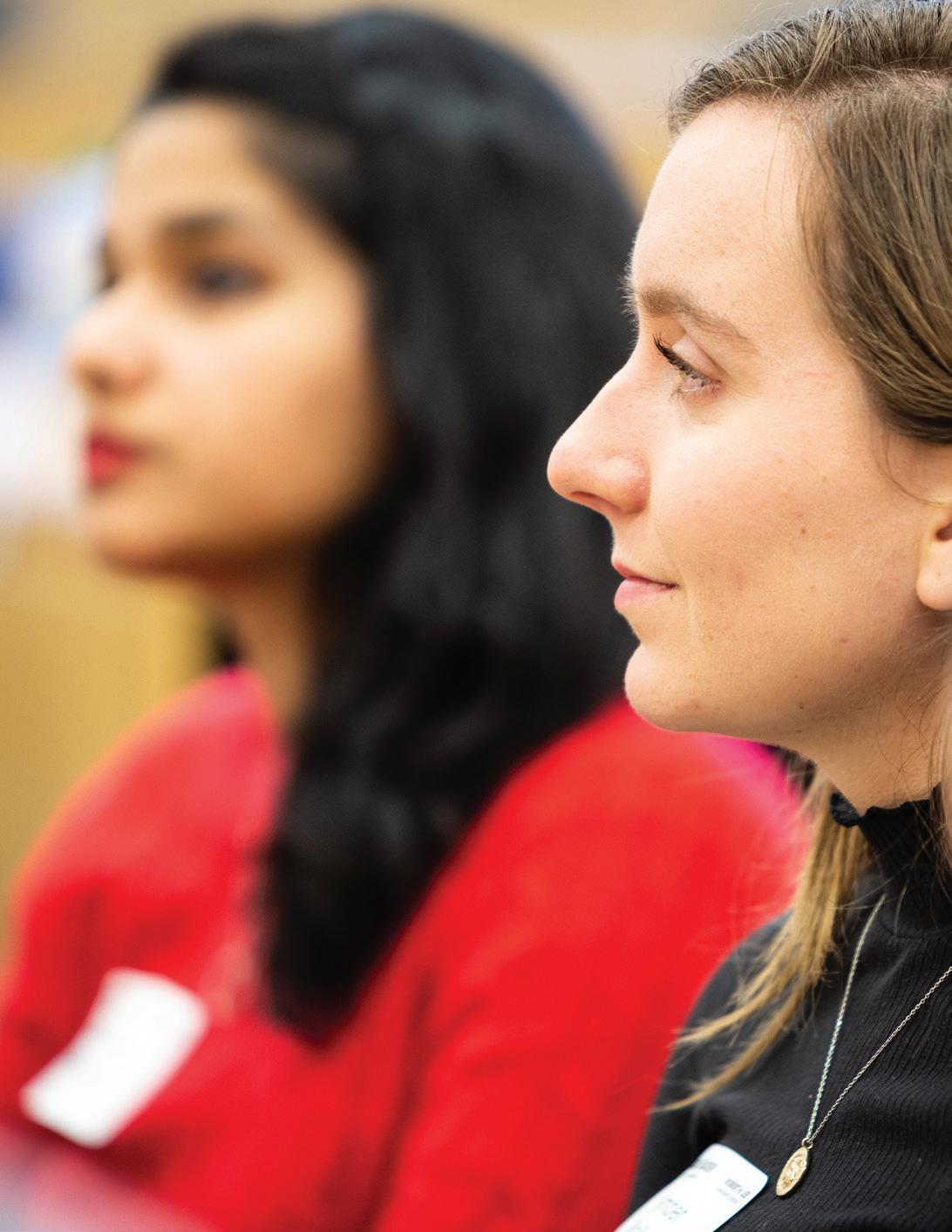
Students in this course participated in a live case study with Vancouver-based company, GeoComply, where they interacted with GeoComply representatives to gain exclusive insight into the company’s EDI strategy and management. Students drew on course concepts to analyze and evaluate GeoComply’s current EDI practices and provided the company with evidence-based recommendations on how the company could improve their EDI management. In addition, winning teams in this case study had the opportunity to secure internships and jobs with GeoComply.
As part of this course, students conduct a case-study on the LNG Canada project. Indigenous Relations is a major aspect of the case. In addition, this course has two sessions on Canada’s colonial history, Indigenous relations, and current best practices. Students are encouraged to think deeply about the role and responsibility of the private sector in economic reconciliation. An Indigenous faculty member – Adjunct Professor Mark Podlasly – walked students through a deep exploration of the best practices and pitfalls facing corporate Canada as we seek to improve relationships with First Nations, Métis, and Inuit communities. Final student presentations include rich and well-informed explorations of how the private sector can balance traditional business drivers with an Indigenous worldview. In addition, Hereditary Chief Ian Campbell from Squamish Nation also participated as guest speaker for this class.
This MBA course is designed to encourage students to think critically about their workplace experiences and interactions based on their own history and identity as well as think about how the broader workplace context may perpetuate bias, discrimination, and inequality. Students in this course participated in a live case study with Vancouver-based company, GeoComply, where they interacted with GeoComply representatives to gain exclusive insight into the company’s EDI strategy and management (See the description for COHR 486A for more detail on this live case).
UBC Sauder Women in Finance Training (SWIFT) is a finance training program designed for students who self-identify as women, two spirit, or non-binary. SWIFT’s mission is to bring excellence, equity, diversity, and inclusion to students and employers seeking gender equality in finance. Fundamental to the SWIFT program and students is an empowering sense of community.
The SWIFT program launched in Fall 2022 with a series of guest speakers and networking events to inform and inspire a broad student audience. Over 230 students joined SWIFT’s online forum to explore topics in finance and EDI. In January 2023, 10 students were selected from 70 applicants to become the first cohort of SWIFT students.
SWIFT students make a 1-year rolling commitment to hands-on training and professional development. Highlights from Spring 2023 include workshops with employers, faculty, and financial feminists, mentorship from industry, and student-led research. After a semester of intense learning, the inaugural SWIFT cohort ascended to Summer internships with premier employers across the capital markets.
CDL-Vancouver strives to support Venture Founders who identify as women, non-binary or two-spirit, or IBPOC, by recruiting companies with founders of diverse backgrounds and CDL Mentors with similar lived experiences. From the responses collected as part of a survey for the 2022/23 CDL Program year, 26% of CDL Mentors identified as IBPOC and 33% as women; and among Venture Founders, 63% identified as IBPOC and 26% as women. Understanding the composition of the organization’s community informs CDLVancouver of opportunities to support entrepreneurs from all backgrounds within B.C., Canada, and beyond. CDL-Vancouver also aims to work with diverse staff; among the current team, 50% identify as IBPOC and 65% as women.
Additionally, CDL-Vancouver also offers the CDL Apprentice Program to address the gender gap in STEM-related fields by providing an online, multi-module program for those who identify as women (14-18 years old) with a keen interest in STEM-related topics and how science and technology is transforming the world. CDL-Vancouver hosted the health stream and other universities covered subject areas such as AI, AgTech (agriculture technology), Climate, Matter, and Oceans.
The Dhillon Centre views business ethics as encompassing how individuals and companies can operate in ways that promote integrity, compassion, inclusion, responsibility, and societal good. The centre works on a number of events and initiatives related to EDI. Some of our events this past year included:
The Dhillon Centre and the UBC Sauder Dean’s Office have created and co-hosted the JEDDI (Justice, Equity, Diversity, Decolonization, & Inclusion) Seminar Series (www.sauder.ubc.ca/thought-leadership/ research-outreach-centres/peter-p-dhillon-centre-business-ethics/ events/jeddi) featuring academic and business thought leaders sharing their experiences and strategies for creating more just, equitable, diverse, decolonized, and inclusive workplaces (see page 15 for more details).
The Dhillon Centre organized the Emerging trends in responsible investing: Activating new and undersupplied markets across climate and diversity, equity, and inclusion (www.sauder.ubc.ca/event/ emerging-trends-responsible-investing-activating-new-andundersupplied-markets-across-climate), with Andrea Barrios, Senior Impact Investment Manager at Vancity.
The Dhillon Centre and Ch’nook Indigenous Business Education at UBC Sauder co-hosted the Indigenous considerations in ESGI: Attracting investment, advancing reconciliation, and breathing life into UNDRIP (www.sauder.ubc.ca/event/indigenous-considerations-esgiattracting-investment-advancing-reconciliation-and-breathing), with Geordie Hungerford, Chief Executive Officer of the First Nations Financial Management Board.
The Dhillon Centre developed and hosted the “Behavioural Insights into Business for Social Good Conference,” which included talks by researchers and practitioners on EDI subjects including the efficacy of diversity training initiatives, the concept of Indigenomics and Indigenous economic inclusion, and behavioural interventions to enhance equity and inclusion.
The Dhillon Centre hosted an event to showcase research from previous “Business for Social Good” grant winners. These included research on EDI topics from Jiawei Li addressing “From individual to society: A multi-level model for diversity training reaction,” Lucy De Souza presenting “What forms of male allyship are effective at fostering inclusive cultures for women in STEM workplaces?,” and Valentina Rutigliano on “The entrepreneurship gap” (on gender differences in entrepreneurship).
The Montalbano Centre for Responsible Leadership Development’s mission is to create a more just, sustainable, and prosperous world. The centre’s focus is to promote responsible leadership as a core value, a skillset, and as an emerging field of discipline.
This year, The Montalbano Centre appointed a Post-Doctoral Fellow, Dr. Samantha Dodson. Dr. Dodson’s research looks at the causes and consequences of interpersonal distress (e.g., discrimination, sexual harassment) experienced by women and other stigmatized identities at work. Check out her recently published paper in Organization Science: “Moral Foundations, Himpathy, and Punishment Following Organizational Sexual Misconduct Allegations.”
The Montalbano Centre held a mini-conference, where previous grant winners show-cased their research. These included Eric Mercadante and Karl Aquino on “How do leaders propagate ethical (or unethical) behaviour through hiring and promotion practices?,” Rebecca Paluch on “How are business schools responding to stakeholder calls for more equity, diversity, and inclusion in their curriculum and culture?,” Dr. Michael Daniels and Dr. Sandra Robinson on “How can leaders more effectively respond to unethical behaviour after (as opposed to before) it occurs?,” and Dr. Kai Li on “Under what conditions do female financial analysts outperform their male counterparts in terms of forecasting accuracy?”
UBC Sauder LIFT is a program that transcends international borders to deliver essential business tools to a classroom of aspiring entrepreneurs. At its core, LIFT represents: Leadership, Innovation, Fundamentals, and Training. Leveraging both virtual and in-person relationships, the program’s primary focus is to provide fundamental business training to aspiring entrepreneurs from all backgrounds. The goal is to equip participants in launching or scaling their businesses and contribute to the overall growth of the economy. Year-round, UBC students lead business training programs for participants in Kenya and Ghana. Since UBC Sauder LIFT’s inception in 2006, the program has served more than 800 aspiring Kenyan entrepreneurs of all socioeconomic backgrounds, gender identities, experiences, and continues to reach more African communities.
The UBC Sauder LIFT team is committed to offering equal access to these learning opportunities and interviewed all candidates interested in the program. The cohorts in Mathare and Ghana include 74% women and 26% men. UBC Sauder LIFT also continued to work with One Girl Can, a charity that aims to break
the cycle of poverty and works towards gender equality through education and mentorship, in its program for 32 Kenyan women entrepreneurs. The UBC students partaking in the program are exposed to a unique opportunity to learn about other cultures, witness the growth of a business, contribute their own ideas and experiences, and observe the impact that education has on economic development.
Decision Insights for Business & Society (UBC-DIBS) is a behavioural research and policy solutions initiative at the UBC Sauder School of Business. Our mission is to improve outcomes across major societal and planetary challenges by improving our understanding of decision-making and helping people make better choices—choices that are better for themselves and for the world.
UBC-DIBS produces the Calling DIBS podcast about applied behavioural science. Several episodes focused on EDI topics:
• Episode 37 (blogs.ubc.ca/biwiki/podcast/#37): “How Can Behavioural Insights Help Organizations Be More Diverse, Inclusive, and Equitable?” (BI x EDI Part 1)”; Sylvia Apostolidis, President of the Jasmar Group
• Episode 38 (blogs.ubc.ca/biwiki/podcast/#38): “How Can Being More Equitable, Diverse, and Inclusive Improve the Field of Behavioural Insights?” (BI x EDI Part 2)” Sylvia Apostolidis, President of the Jasmar Group
• Episode 41 (blogs.ubc.ca/biwiki/podcast/#41): “Behavioural Insights and Reconciliation” with Stephanie Papik, the Moose Hide Campaign Society’s Director for the Public Service.
• Episode 58 (blogs.ubc.ca/biwiki/podcast/#58): “Include Indigenous Worldviews” with Emily Salmon, PhD student, University of Victoria, and Member of Cowichan Tribes
UBC-DIBS co-hosts the annual BIG Difference BC conference with the BC Behavioural Insights Group and WorkSafeBC. The 2022 conference on “Using Behavioural Insights to Create Lasting Change” included the following sessions.
• The keynote address, Dr. Crystal Hall (University of Washington) on “Antiracist Applied Behavioral Science: Using Our Tools to Confront Structural Racism.”
• Lightning talks, Behavioural Science Aotearoa on “Combining Behavioural Science and Indigenous Cultural Values: Partnering with Māori Wardens to Reduce Warrants to Arrest in Aotearoa New Zealand.”
• The 2022 conference integrated Circle Practice into the welcome and closing remarks. This was guided by Stephanie Papik, an Indigenous member of the conference planning committee and BIG Difference Advisory Board.
Several UBC Sauder initiatives have supported the goals of enhancing and encouraging faculty and student research on topics specifically linked to equity, diversity, and inclusion. These initiatives include the UBC Sauder EDI Research Catalyst Grant, Peter P. Dhillon Centre for Business Ethics Business for Social Good Grant, Montalbano Centre for Responsible Leadership Grant, and the UBC Sauder Dean’s Exploratory Grant. Across these UBC Funding Sources, 20 unique projects related to EDI have been funded for a total of $108,700. More on some of these initiatives is detailed below:
The Peter P. Dhillon Centre for Business Ethics and the UBC Sauder Dean’s Office offered the UBC Sauder EDI Research Catalyst Grant (www.sauder.ubc.ca/current-students/ubcsauder-edi-research-catalyst-funding ) initiative to encourage and incentivize research specifically focused on EDI. The purpose of the initiative is to encourage and support UBC Sauder research on topics relevant to EDI and to seed initial research ideas in this domain so that researchers can apply for additional funding. This year, four grants were awarded to recipients Karl Aquino, Jenny Li Zhang, Minjia (Minka) Li, Yiwen Jin, Siddhanth Mookerjee and Yann Cornil on topics related to boardroom diversity, perceptions of minority-owned businesses, perceptions of women leaders, and the impacts of EDI initiatives.
This grant supports and encourages research involving graduate students in the domain of business for social good. The goal of this initiative is to support early-stage and innovative research examining how business can be a force for social good. This year, six grants were awarded to recipients Irein Thomas, Gabrielle Voiseux, Gideon Odionu, Jiangze Han, Shangwen Yi, and Hsuan-Che (Brad) Huang on topics related to Reconciliation, allyship, charitable giving, and EDI.

The Montalbano Center for Responsible Leadership Development awarded several research grants this year, focused on developing leaders to better manage their own and their organization’s impact on the triple bottom line of people, planet, and profit. Grants this year included topics such as gender representation on corporate boards, reactions to sexist behaviour at work, gender gaps in entrepreneurship, and performative support for EDI on the part of leaders. This year’s recipients include Hsuan-Che (Brad) Huang, Kai Li, Jon Evans, Jan Bena and Valentina Rutigliano.
Recruiting and retention practices that eliminate biases and barriers, and increase representation of under-represented and marginalized groups in order to create an organization that embodies diverse perspectives, enhance feelings of belonging, inclusion and safety, and increase accessibility.
Faculty members who are recruiting have received new training on implicit bias and strategies for inclusive hiring. In addition, we are pilot testing some new best practices for hiring faculty, including formally asking for EDI statements as part of the application process, extending applicant pools and shortlists, and using standardized scoring rubrics for evaluating job candidates.
For the past year, UBC was an academic partner with The PhD Project. This is an internationally recognized program that supports minority groups that have traditionally been underrepresented in doctoral programs at business schools and helps universities to recruit broader pools of applicants. University partners with this project are committed to diversifying our own campuses, the academic community, and the corporate culture more broadly. The project helps universities to expand shortlists and attract a broader diversity of applicants, including those from Black, Latinx, and Indigenous backgrounds.
The Robert H. Lee (RHL) recruitment team participated in virtual recruitment events with a dedicated focus on enhancing the diversity of all RHL programs. They participated in 57 in-person and 17 virtual recruitment fairs across nearly all continents, with presence in more than 40 countries, including a women-specific MBA event with Forte.
The Undergraduate Office (UGO) works with UBC Enrolment Services to enhance recruiting of Indigenous students, which includes promoting higher education, exploring interests, and finding the right fit before connecting students with appropriate faculties. In addition, the UGO supports Destination UBC which connects with Indigenous, Black, and Beyond Scholars, as well as Indigenous Experience UBC, and works with programs such as the UBC-Langara Indigenous Transfer Partnership.
The UBC Sauder Human Resources team, particularly the EDI Recruitment Working Group, has integrated process improvements as it relates to diverse hiring of UBC Sauder staff. Some examples include:
• Conducted a Talent Acquisition Survey for UBC Sauder people leaders, which included questions around attracting diverse candidates and creating diverse teams.
• Attended MOSAIC’S 11th career fair, which supported 3,500+ attendees that serve immigrant, refugee, migrant and mainstream communities in Greater Vancouver and the Fraser Valley, to attract more diverse candidates for our applicant pools.
• Updated Exit Interview questions and annual report to reflect EDI questions.
Across Robert H. Lee (RHL) Graduate School programs, several entrance scholarships were offered that support different elements of EDI. These include 43 scholarships focused on students from specific geographical regions (e.g., Middle East, Africa, Asia, Latin America, etc.), and 11 women-focused scholarships. In addition, seven EDI-related in-program scholarships were offered, included six Dean’s Excellence in Diversity Awards and one scholarship aimed at supporting Indigenous Women at UBC Sauder.
At the undergraduate level, UBC Sauder offers over 25 awards for IBPOC students. Communities these awards serve include Indigenous, women, Black, and those from communities that have been historically, persistently, and systemically marginalized. Of note, the first 2SLGBTQIA+ student award at the University is being established for Bachelor of Commerce
• Incorporated training on EDI language and best practices into new manager training for the employee cycle at UBC Sauder.
• Requesting and including the correct pronouns of new hires and updating current employees in Workday/The Hub to ensure correct pronouns are being used
• Recommending EDI focused-interview questions to hiring managers.
• Continuing to use additional platforms to post UBC Sauder jobs to compliment the candidate pool.
• Continuing to partner with BC Partners in Workforce Innovation to recruit for people with disabilities.
• Continuing to work with leaders to assist in diversifying candidate pools.
students who identify as 2SLGBTQIA+, and have demonstrated an interest in community service and leadership qualities. Another new award recently approved is for students who are First Nations, Inuit, or Métis students of Canada or who identify as Black or as a Person of Colour and have demonstrated an interest in real estate.
UBC Decision Insights for Business and Society (DIBS) and Continuing Business Studies (CBS), in collaboration with BIG Difference BC, offer the BIG Difference BC scholarship, which is given to one student per year in the Advanced Professional Certificate in Behavioural Insights. The scholarship is open to public and non-profit sector working professionals in B.C. and priority is given to people who identify as IBPOC, 2SLGBTQIA+, persons with disability, and/or women.
This year is the second year that UBC Sauder faculty members have formally been asked to report their contributions to EDI in their yearly Faculty Activity Reports. This signifies the importance of EDI to UBC Sauder.
This year is the second year that we have given an award for faculty and staff contributions to EDI at UBC Sauder. The award was given to Dharm Joshi, Director, MBA Programs, for her contributions to EDI at UBC Sauder.
We have completed a washroom review/feasibility study focused on providing more welcoming, accessible washroom access for students, faculty, staff, and visitors of the UBC Sauder community. The washroom review assessed existing washroom facilities in the current building(s) to identify those washrooms that have the potential to be suitable for conversion to allgender multi-stall or single occupancy washrooms.
With the specifically intention of consulting with UBC Sauder communities who have lived experience as 2SLGBTQIA+ and people with disabilities, we have also created a survey to understand the washroom ideas, needs and preferences of our UBC Sauder Communities, with a particular focus on gathering feedback to inform future all-gender washroom designs.
We also are actively working on plans for our new building, which will purposefully include more access to all-gender washrooms and focus on creating spaces that are accessible and inclusive for all members of our UBC Sauder Community.
In 2011, UBC Sauder only had four Automatic Door Openers (ADOs) in the building. Since 2012 we have installed 12 more ADOs to remove barriers and ensure a more inclusive environment. Total ADOs in the building(s) are 17. In the reporting period, we have installed three additional ADOs.
In the past year, we have installed five sit-stand tables in five UBC Sauder restricted classrooms to increase accessibility for individuals with disabilities.
The maps and statistics display the cultural diversity of UBC Sauder students and full-time faculty in terms of citizenship. Students and faculty are citizens of a wide range of countries, as shown by our diversity scores, measured by the Gini-Simpson Diversity Index. The Gini-Simpson Diversity Index is the probability that two people taken randomly have a different country of citizenship, where higher numbers indicate more diversity.

World map of student citizen diversity in 2022-2023
This map shows the countries of citizenship of students enrolled in any UBC Sauder program as of April 2023. A darker colour indicates a higher headcount by country, except for Canada which is intentionally left in a fixed colour. Country of citizenship is the one that students most recently reported to UBC Sauder as their primary citizenship.
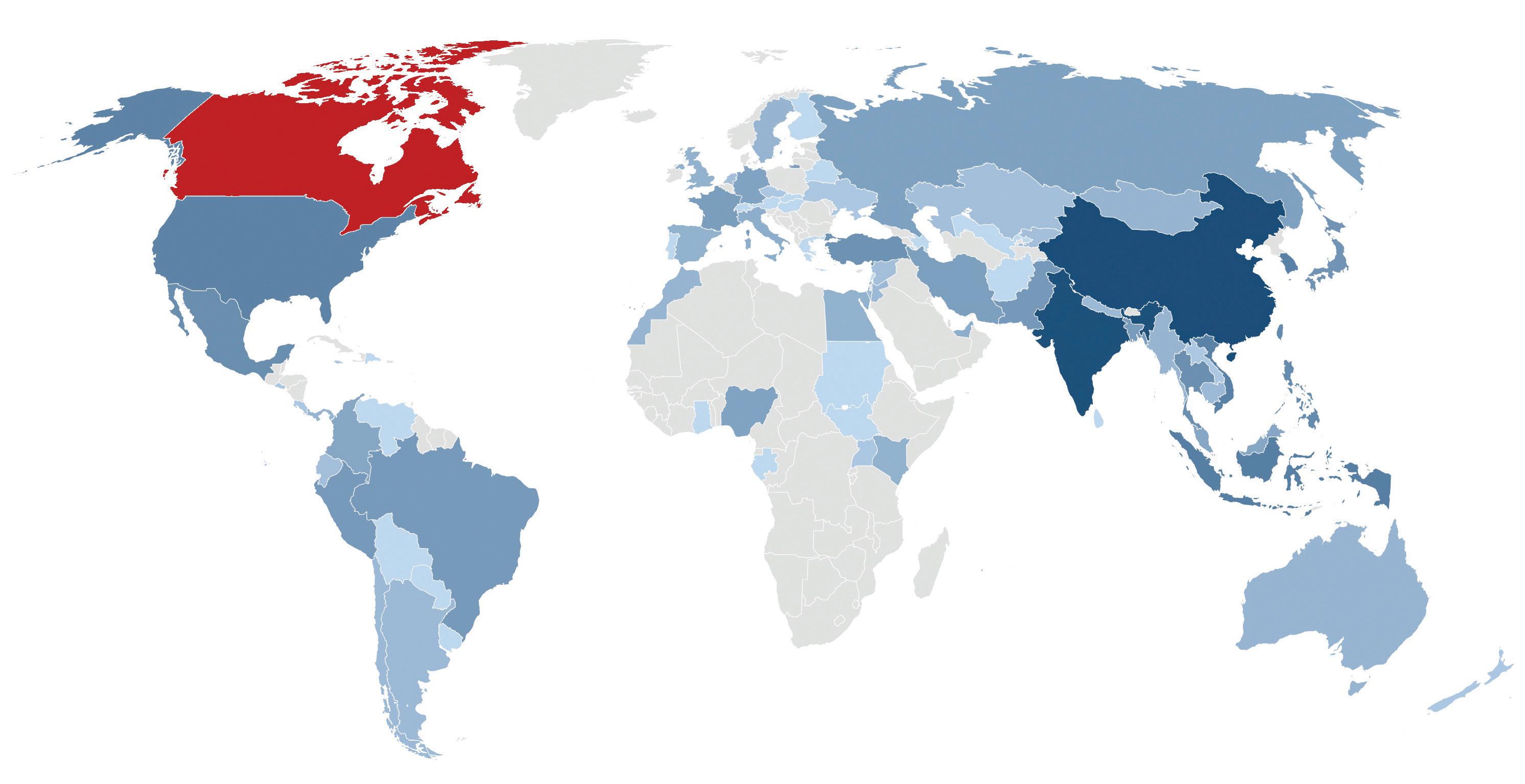
Number of Students
Cultural diversity of UBC Sauder Students in terms of citizenship
Gini-Simpson Diversity Index (by citizenship) 2022
63 % 73 % 57 %
Number
Gini-Simpson Diversity Index represents the probability that the two students taken at random have a different country of citizenship
This map shows the countries of citizenship of full-time faculty (research and teaching) working at UBC Sauder as of April 2022. A darker colour indicates a higher headcount by country, except for Canada which is intentionally left in a fixed colour. Country of citizenship is the one that faculty had at the time they joined the School (the map does not account for changes in citizenship after faculty joined the School). Faculty with dual citizenship at the time they joined the School are represented twice on the map.
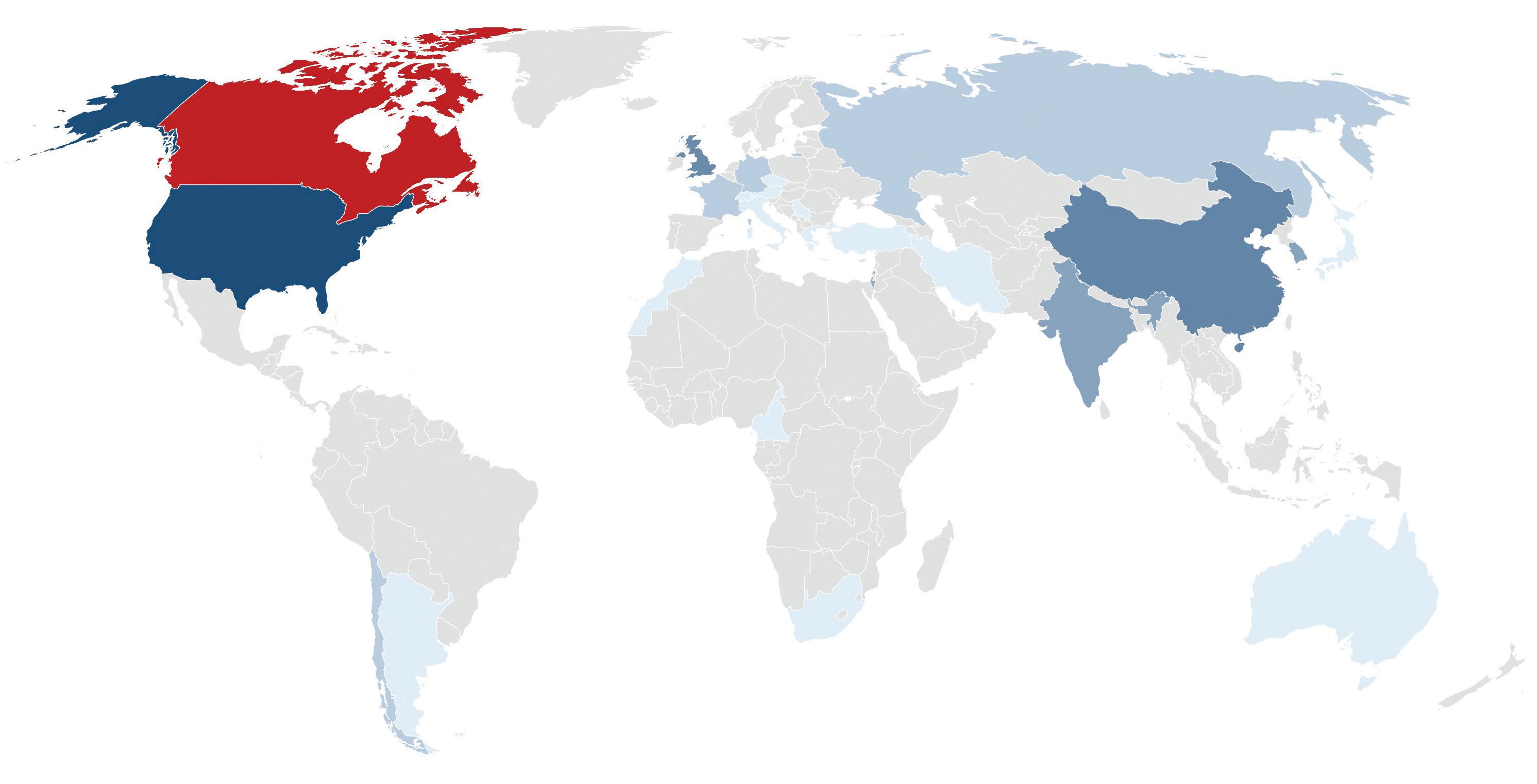
Gini-Simpson Diversity Index (by citizenship) 2022
83 % 47 %
Number of countries of citizenship 2022
Our overall UBC Sauder community (i.e., students, faculty, and staff) represents 90 countries.
Total headcount
31
Gini-Simpson Diversity Index represents the probability that the two faculty taken at random have a different country of citizenship
students at UBC Sauder
Since 2012 , the number of Indigenous students enrolled in the BCom program has increased by 142 %
71 2.8 %
Total Indigenous BCom Students of domestic students
We note that one limitation is that we do not have data on Two-Spirit people at UBC Sauder.
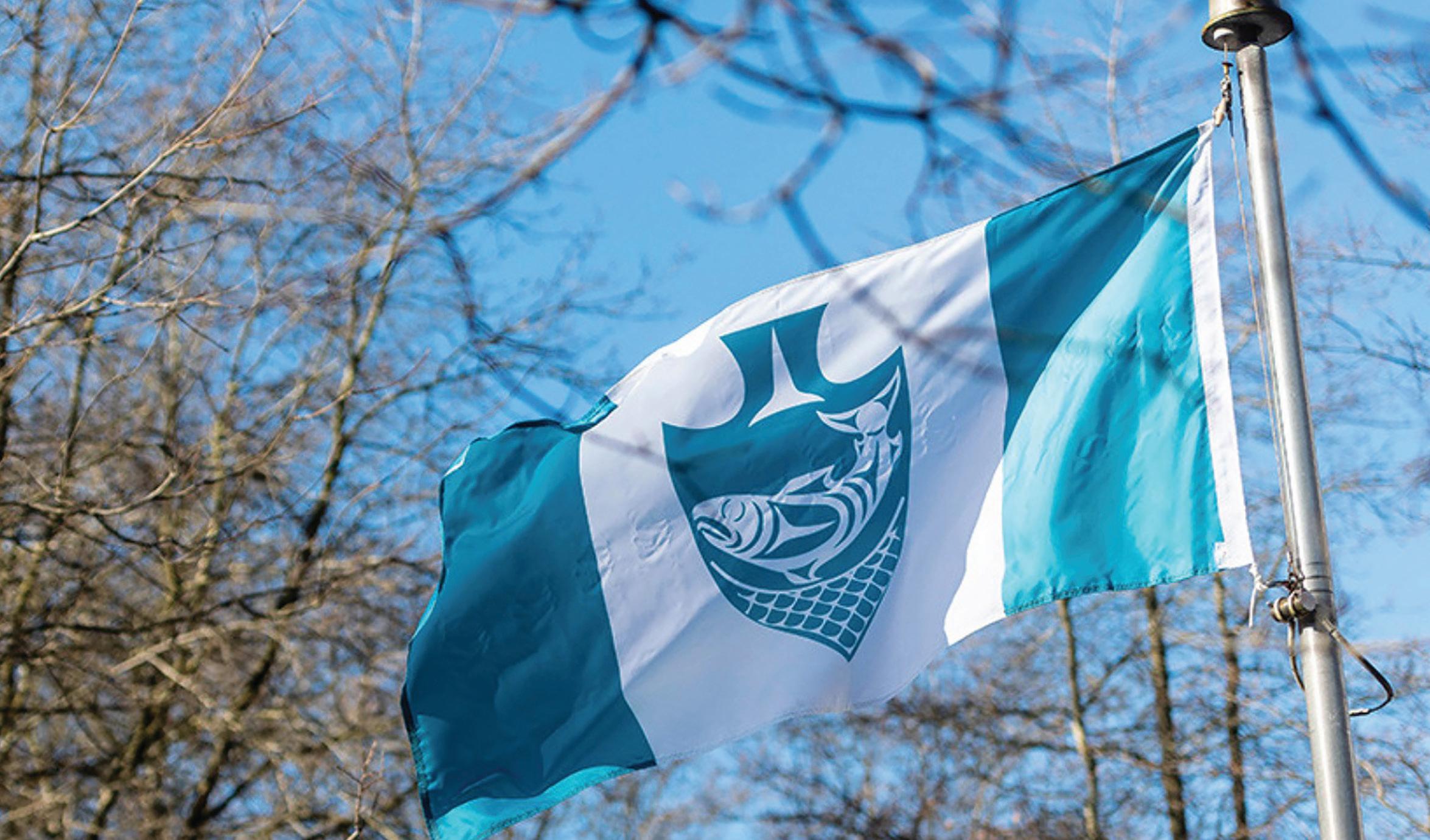
The data that we present on gender and racialization is collected by the UBC Equity and Inclusion Office as part of the Employment Equity Survey which staff and faculty are asked to complete. The questions in the survey were revised in 2021. Response rates for these data are: research faculty (92%), teaching faculty (85%), and staff (95%).
We note that a data suppression policy has been adopted by the UBC Equity and Inclusion Office to further protect the confidentiality of individual respondent’s personal information. Only groups with five or more respondents are reported.
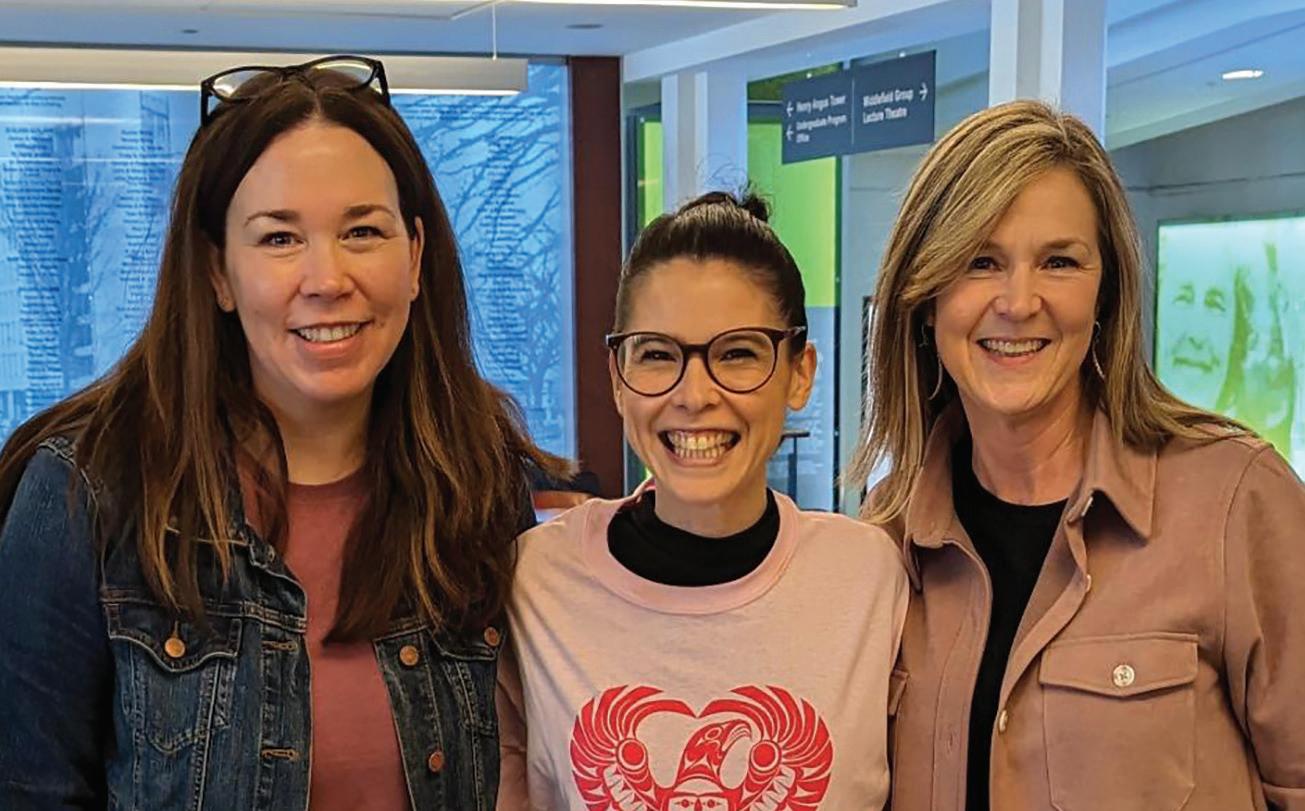
Gender (share of women):
47 % 31% 72 %
Teaching Faculty Research Faculty Staff
The question asked was: “Do you identify as a woman, man or non-binary person?” and the responses were: Woman; Man; Non-Binary Person; Prefer not to answer.
36 % 39 % 45 %
The question asked was: “Do you identify as someone who is racialized, a visible minority, person of colour, or an analogous term? The term “racialized” is used as a more current term than “visible minority” from the Employment Equity Act (1995). For the purposes of this survey, members of racialized groups are persons who do not identify as Indigenous peoples (as defined in the previous question), and who do not identify as primarily White in race, ethnicity, origin, and/or colour, regardless of their birthplace or citizenship.” and responses were: Yes; No; Prefer not to answer.
Unfortunately, we do not have accurate and representative student data that we can share for some types of demographic information. For gender, some of our UBC data still reflects binaried sex data or does not have representative samples of respondents. Presenting only binary sex data is exclusionary and does not accurately represent the gender diversity of our students, including non-binary students. We recognize that gender identity is self-determined and not synonymous with sex, and we have updated our internal surveys and data collection methods to be gender inclusive going forward. We also do not have data on racialization to report on our students. We are continuing to work with UBC toward collecting and sharing data for our student populations.
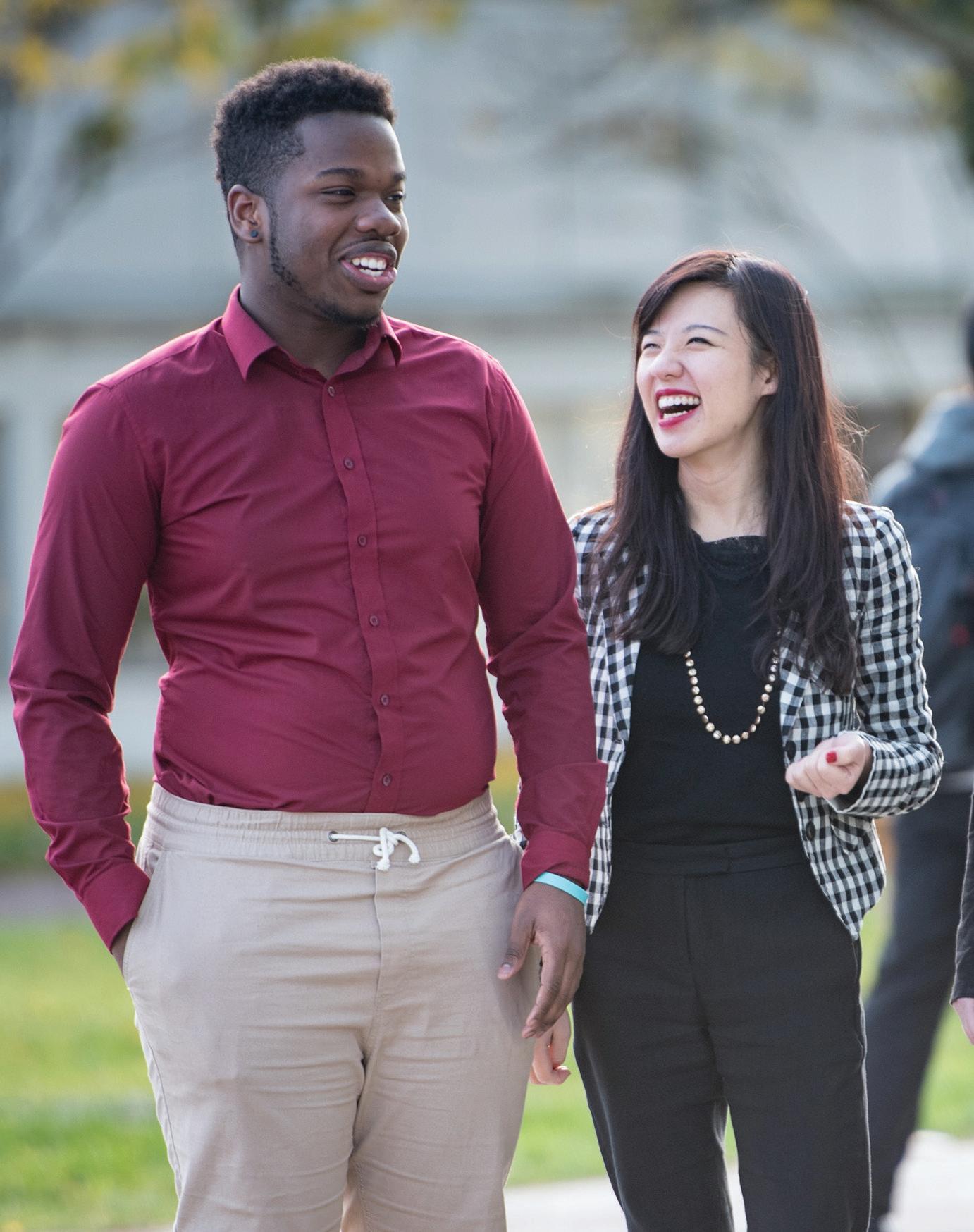
We have finalized our EDI principles and goals and have created a scorecard for reporting back on actions, KPIs, who is accountable, and timelines for completion. In doing so, we
have initiated a process for unit heads to report back on actions and KPIs around EDI, many of these are showcased in this report.
UBC Sauder has been working towards embedding EDI criteria in partnerships with employers, external contractors, Indigenous communities of interest, alumni, and other external stakeholders toward supporting an inclusive environment at UBC Sauder. Some examples include:
• The Events Team and other groups at UBC Sauder aim to promote sustainability and responsible leadership through using more sustainable and inclusive vendors and caterers at events.

• The Events Team purchased gift boxes for special events such as the Dean’s Dinner and employee anniversaries to be inclusive of different vendors in the community.
• UBC Sauder Human Resources gives gifts of appreciation for staff service (of 15, 20, 25 years) and gives the choice of Indigenous crafted gifts from the UBC Museum of Anthropology or a donation to the Indian Residential School Survivor Society.
It is important to us that our communication is two-directional and that we listen to our UBC Sauder Communities in addition to communicating out to them. To this end, the UBC Sauder EDI Committee collected survey data on student experiences related to equity, diversity, and inclusion. The survey asked questions about feelings of inclusion, equitable access to resources, EDI in courses, and UBC Sauder leadership’s efforts around EDI. The survey was available to all undergraduate and graduate students at UBC Sauder from September 20th to October 16th, 2022. Students were entered into a draw for gift cards in thanks for their participation. In total, 270 undergraduate students and 102 graduate students participated in the survey.
Overall, responses were fairly positive for average ratings of inclusion (Mean = 3.92), access to resources (M = 4.10), EDI topics in UBC Sauder’s curriculum (M = 3.79), and the role of UBC Sauder’s Leadership in EDI (M = 3.83; all on 5-point scales).
Here are the overall results for ratings of inclusion:
To which extent do you agree with the following statements about your general experience at UBC Sauder School of Business?
I feel a positive sense of belonging and inclusion at UBC Sauder
I feel my beliefs, identity, and experiences as an individual are valued at UBC Sauder
I feel included by most people I encounter at UBC Sauder
I have considered leaving UBC Sauder because I felt isolated or unwelcome
I feel that making social connections and finding community is easy at UBC Sauder
I feel that UBC Sauder fosters a culture of respect and understanding
I feel that UBC Sauder demonstrates a strong commitment to equity, diversity, and inclusion
Here are the results looking at overall ratings of inclusion broken-down by different groups:
Barriers to Accessibility
Persons experiencing significant and persistent or recurring mobility, sensory, learning, or other physical or mental health impairment
No impairment listed above
1Index based on the 7 items measuring general sense of inclusion (see previous slide), answered on scales ranging from 1 (Strongly Disagree) to 5 (Strongly Agree). The item “I have considered leaving UBC Sauder because I felt isolated or unwelcome” was reverse-coded for the computation of the index.
Although these ratings are generally fairly positive in the first figure above, it is notable that there are some differences between groups (as depicted in the second figure). For example, there are differences in rating of inclusion for gender, whereby students who are transgender and/or non-binary report lower levels of inclusion than men and women, and women report somewhat lower levels of inclusion than men. Those who are racialized report lower levels of inclusion than their non-racialized counterparts and who are 2SLGBTQIA+ report lower levels of inclusion than their non-2SLGBTQIA+ counterparts. In another example, students who report having a disability indicate lower levels of inclusion than those who do not report having a disability. Another interesting finding was that Indigenous students reported somewhat higher levels of inclusion than non-Indigenous students.
To see our full survey results please see here (www.sauder.ubc. ca/sites/default/files/2023-05/EDI%20SURVEY%20OF%20 STUDENTS%20FINAL%20REPORT.pdf).

Taken together, the results paint a fairly positive picture of inclusion when looking at the data overall in terms of access to resources, course content, and leadership’s role in EDI at UBC Sauder. Importantly, however, the results also point to some key differences between groups. This is where we see there is more work to be done in terms of encouraging, including and amplifying the voices of students from marginalized communities.2
2Marginalized communities can include, but are not limited to: Indigenous peoples including First Nations, Inuit, Metis, and Two-Spirit peoples, racialized people and people of colour, LGBQIA+ communities, transgender, non-binary, and gender variant persons, women, people with disabilities, individuals with low income and facing poverty, and immigrants.
One way that we are communicating what is going on at UBC Sauder in EDI is through our Annual Report. This is the third version of our EDI report. Last year, we created a new webpage for EDI at UBC Sauder. The page highlights our core principles and goals, promotes current events and news stories, showcases ways to get involved, and provides links to sources of support. You can see the webpage here (www.sauder.ubc.ca/currentstudents/equity-diversity-inclusion?auHash=dy6-8uY4QE5JBK EKuLjgP9oZXI5t2OhfWeBdJWsGm-A ). In addition, staff and faculty are regularly updated with EDI-related events, initiatives, and resources on the UBC Sauder Hub.
We have created a Communications Working Group that will focus on better communication of events and initiatives, as well as communicating about policies and procedures related to EDI at UBC Sauder. The group recently created a resource for students to navigate how and where to access support when needed at UBC Sauder.
We are currently planning our new building. The design of the new building will also enhance the School’s focus on collaboration, inclusion, and reconciliation. This will create accessible, welcoming, multi-functional spaces to meet the diverse social and learning needs of the UBC Sauder community.
Key elements planned for the new building include:
• Spaces and features that support Indigenous students, advance the UBC Indigenous Strategic Plan, strengthen the School’s connections with Musqueam, and expand Indigenous programs and priorities at UBC Sauder.
• Accessible, purpose-designed features that ensure people of all abilities and learning styles can succeed and thrive, including (but not limited to) wheelchair access, gender inclusive washrooms, a breastfeeding room, and digital accessibility tools to accommodate a range of abilities such as visual acuity, neurodiversity, etc.
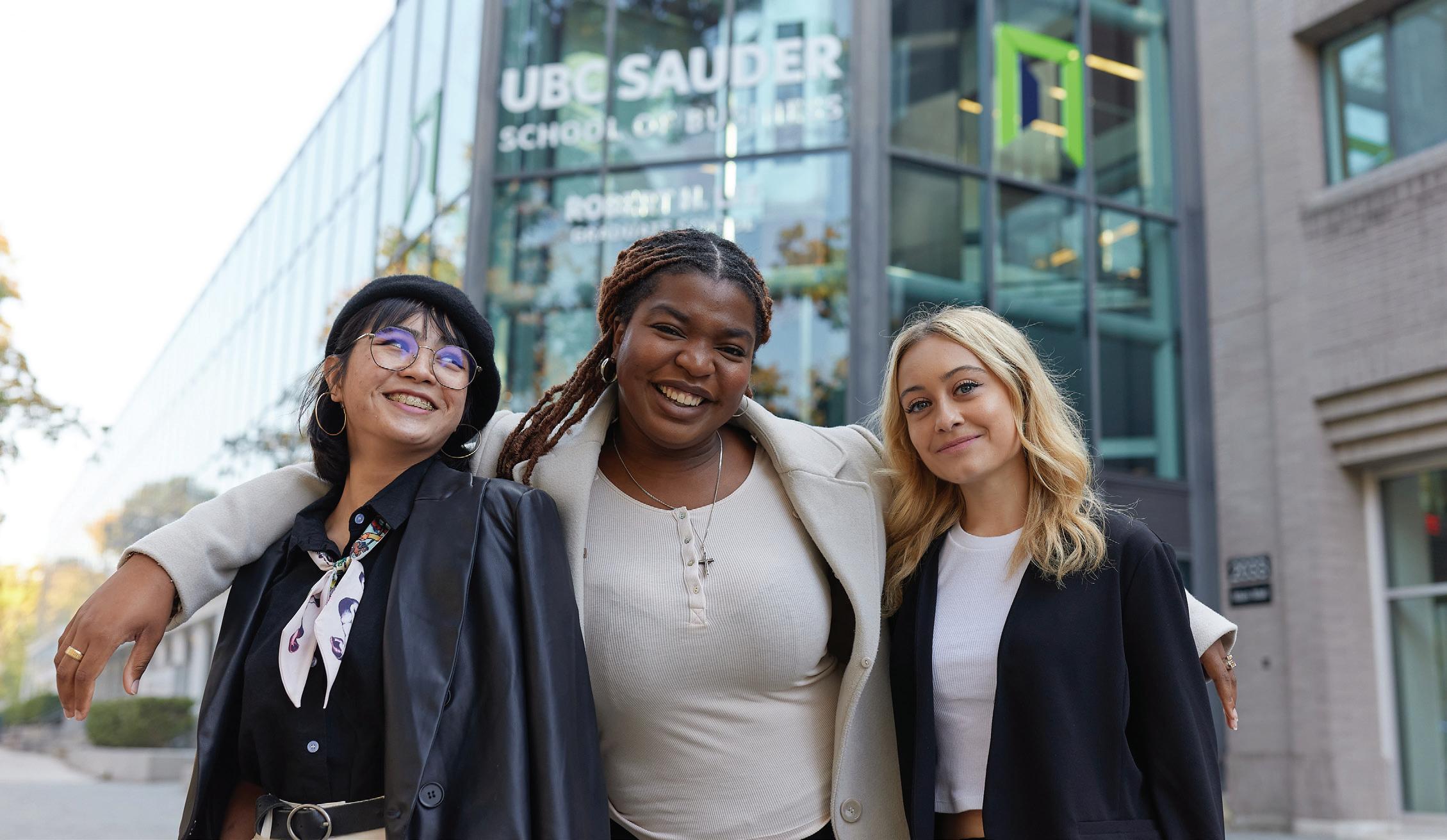
The EDI Training Working Group is currently working on creating a training program for UBC Sauder staff and faculty. The training program is a self-paced Canvas course that accommodates the different knowledge and needs of each participant. Participants will be able to choose different paths composed of different modules. These tracks include an introductory track for those who are newer to EDI concepts, a more intermediate track for those with some knowledge, and an advanced track for those who already have a background in EDI. Our EDI training program is designed to meet our community members where they are, to give them the personal EDI tools and knowledge they need in order to work towards a common goal of creating a better future for all members of our community.
As UBC Sauder moves ahead in ways that support the UBC Indigenous Strategic Plan, the UBC Sauder Strategic Plan, and our UBC Sauder EDI Strategic planning, the School is working on the following:

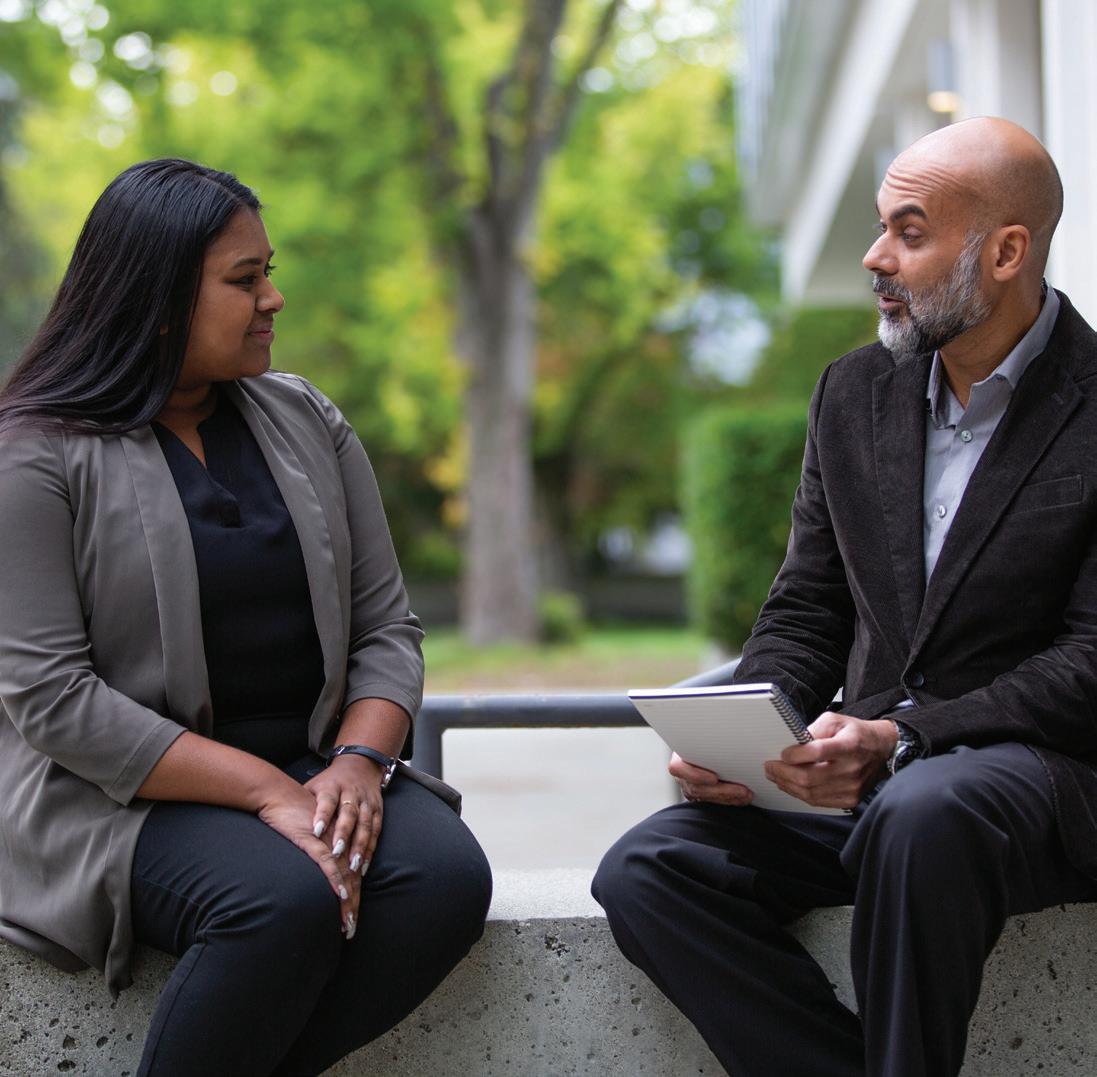
• Installation of the carving “Intersection of Enlightenment” by famed Musqueam artist Susan Point in the main foyer of the UBC Sauder School of Business Henry Angus building. Inspired by Ancestral Musqueam weaving, this contemporary artwork will be suspended in the School’s atrium and convey the themes of Coast Salish Commerce and the history of trade. Based on traditional teachings, the installation pays tribute to this land and its earliest inhabitants, and symbolizes the coming together of people crossing paths and interweaving cultures.
• Hiring of an Indigenous student recruiter to facilitate increased recruitment of Indigenous students to UBC Sauder degree programs.
• Hiring of an Executive Director for a new Centre for Indigenous Business.
• Continuing to provide Indigenous Cultural Awareness training sessions to UBC Sauder employees on the history and legal framework of Indigenous peoples in Canada.
The UBC Sauder School of Business is committed to continuous improvement in EDI. All of us have a part to play in furthering equity, diversity, and inclusion. Ultimately, we strive to be a place where everyone—students, faculty, staff, alumni, and visitors—feel that they belong. The UBC Sauder EDI Committee and the School leadership welcome your feedback and would love to hear from you about innovative ideas and solutions in this space.
Please check out this page of our website for some different ideas around how to get involved: https://www.sauder.ubc.ca/about-ubc-sauder/equity-diversity-inclusion/get-involved
If you have some ideas for what you would like to see in EDI at UBC Sauder, please consider applying to the EDI Action Fund. The fund supports and encourages EDI events, initiatives, and resources that are dreamed up by you—members of our UBC Sauder Communities. Learn more at: www.sauder.ubc.ca/current-students/ubc-sauder-edi-action-fund
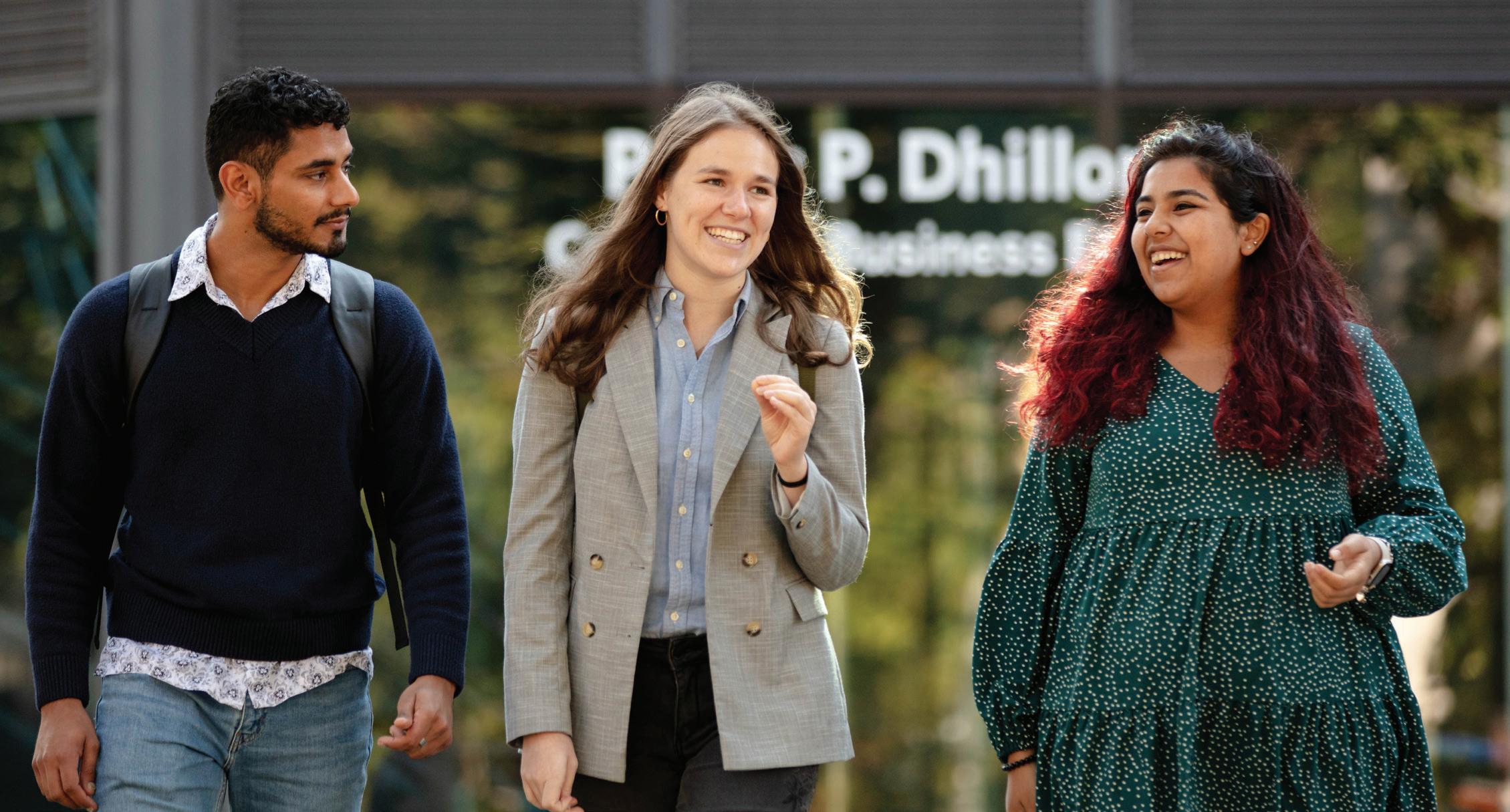
We gratefully acknowledge the contributions to this annual report from these passionate individuals from across our UBC Sauder communities.
Kirstin Appelt
Research Director, UBC Decision Insights for Business & Society (UBC-DIBS)
Academic Director, UBC’s Advanced Professional Certificate in Behavioural Insights
Alex Balbino
UBC Sauder Undergraduate Research Assistant
Elizabeth Bowker
Lecturer, Law and Business Communications Group
Larissa Buijs
Senior Writer, Development and Alumni Engagement
Justin Bull
Lecturer, Entrepreneurship and Innovation Group
Erin Catherall
Program Manager, Aboriginal Management Program
Hatice Cavusoglu
Lead, Strategic Decision Support Analytics
Lorena Dexter Chaichian
Associate Director, Communication & Media Relations
Elaine Cho
PhD and MSc Programs Manager
Amadon Coletsis
Associate Director, Alumni Engagement
Yann Cornil
Assistant Professor, Marketing & Behavioural Science
Darren Dahl
Dean
Michael Daniels
Assistant Professor, Organizational Behaviour & Human Resources
Patrick Dore
Senior Analyst, Strategic Projects/Data Analytics
Jonathan Easey
Program Manager, Ch’nook Scholars & DTES Accelerated Business Program
Pascale Frické
PhD Student, Organizational Behaviour & Human Resources
Brad Gamble
Assistant Dean, Marketing and Communications
Pennie George
Adjunct Professor, Finance Division
Managing Director, Portfolio Management Foundation
Ann Gilray
International Programs & Awards Advisor
Rupeela Gill Manager, Leadership and Annual Fund Program, Development & Alumni Engagement
Chris Gorczynski
Interim Lead, Masters Programs
Richenda Grafton
Administrative Assistant, Ch’nook Indigenous Business Education
Jesse Grimaldi
Manager, BCom Careers
Keith Head Professor, Strategy & Business Economics
Joey Hoegg
Senior Associate Dean, Faculty
Isaac Holloway
Full-Time Lecturer, Strategy & Business Economics
Ani Hosepyan
Assistant Dean, People & Organizational Development
Dharm Joshi
Director, MBA Programs
Nicole Kelly
Associate Director, Student Engagement & Development
Darrell Kopke Director, CDL-Vancouver
Jeff Kroeker
Lecturer, Accounting & Information Systems
Jessie Lam Manager, Research Support Services and Special Projects
Sanghoon Lee
Associate Professor, Strategy and Business Economics
Tom Leslie
Communications Manager, Faculty
Minka Li
PhD Student, Accounting and MIS Division
Pam Lim
Assistant Dean and Director, Robert H. Lee Graduate School
Nicole Linzmeyer
Communication & Engagement Specialist, Human Resources
Lucy (Tianyujun) Lu
PhD Student, Marketing and Behavioural Science
Graham McIntosh
Executive Director UBC Sauder Continuing Business Studies and Diploma in Accounting Program
Mahesh Nagarajan
Senior Associate Dean, Research
Rebecca (Becky) Paluch
Assistant Professor, Organizational Behaviour & Human Resources
Teresa Pan
Senior Advisor to the Dean
Samantha Peng
Venture Manager, Creative Destruction Lab
Teresa Pu
Senior Manager, Engagement and Organizational Development
Radhika Patel
UBC Sauder Undergraduate Student
Wayne Rawcliffe
Lecturer, Organizational Behaviour & Human Resources
John Ries
Senior Associate Dean, Special Projects
Sima Sajjadiani
Assistant Professor, Organizational Behaviour & Human Resources
Elicia Salzberg
Senior Associate Dean, Students
Ky Sargeant
CUS Equity Advisor
Christie Stephenson
Executive Director, Dhillon Centre for Business Ethics
Shannon Sterling
Assistant Dean, Undergraduate Program
Zorana Svedic
Lecturer, Organizational Behaviour and Human Resources Division
Christina Sylka
Head, David Lam Management Research Library
Laurent Tjoe
UBC Sauder Undergraduate Student
Conor Topley
Adjunct Professor, Law & Business Communications
Linda Tommasini
Director, Resources & Operations
Erin Townley-Smith
Assistant Dean, Development and Alumni Engagement
Martina Valkovicova
Assistant Dean, Business Career Centre
Ben Wells
TLEF Project Manager
Kate White
Senior Associate Dean, Equity, Diversity, Inclusion and Sustainability
Bruce Wiesner
Associate Dean, Executive Education
Shiqi Zhang
PhD Student, Finance
Zhiying (Izzy) Zhou
UBC Sauder Undergraduate Research Assistant
